The National Saturday Club gives 13–16-year-olds nationwide a unique opportunity to study subjects they love for free, on a Saturday at their local university, college or cultural institution.
1
2022 –23
National Saturday Club members attend weekly Saturday classes led by expert tutors in their local community, and take part in national events throughout the year including visits to leading cultural institutions; Masterclasses with industry; a Summer Show exhibition of all Club members’ work; and a Graduation Ceremony. A remarkable national network of further education, higher education, the cultural sector, and industry works together in partnership to deliver these enriching extracurricular activities.
With a particular focus on engaging young people from underrepresented backgrounds, the National Saturday Club’s established model has proven impact. The programme offers a transformational opportunity to build versatile and creative skills, develop confidence and discover pathways to further study and future careers.
Club member, Coleg Sir Gâr Founders’ note 3 Foreword from the Chair of the Board 5 Chief Executive’s summary 6 Overview 8 Club subjects 9 Annual programme 14 Research and evaluation 20 Club year in numbers 2022–23 21 Features 24 Building skills for the industries of tomorrow 25 By design: a powerful network 31 Cultural access: a way in for young people 37 Governance 42 Saturday Club Trust 43 Tutors’ Advisory Group 44 Youth Board 46 Financial overview 50 Our Partners 54 Host institutions 55 Masterclass givers 56 Cultural partners 64 Thank you 66
“I love coming to Saturday Club – it’s the highlight of my week”
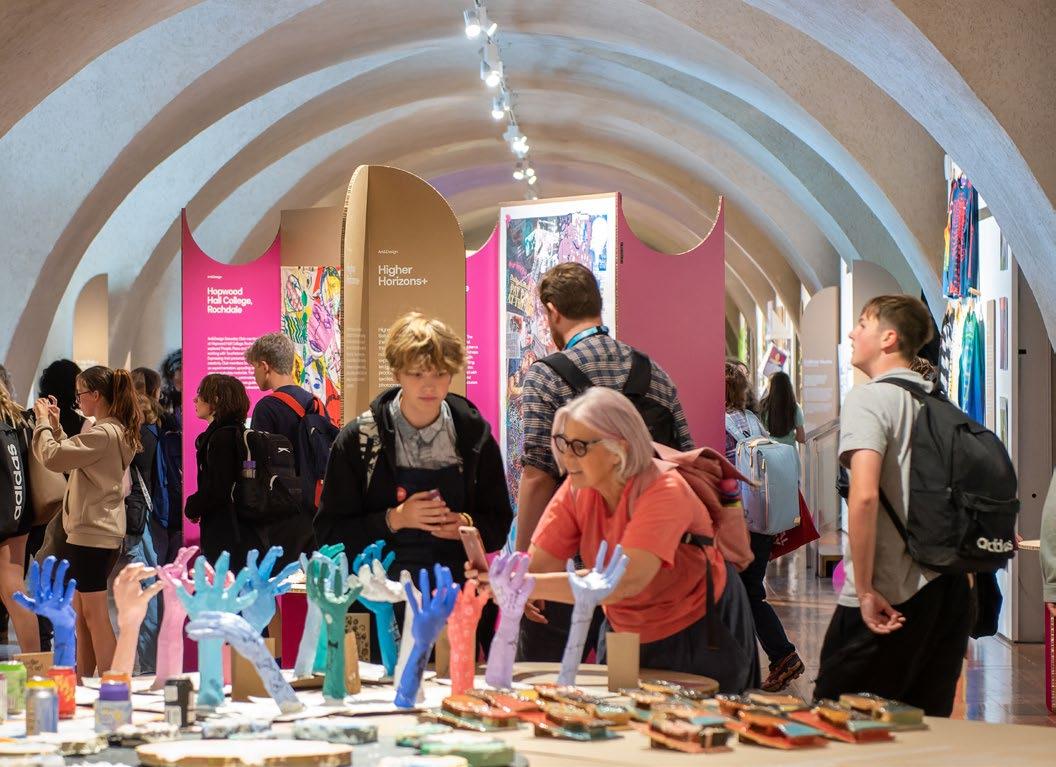 National Saturday Club Summer Show 2023 at Somerset House
National Saturday Club Summer Show 2023 at Somerset House
Founders’ note
John and Frances Sorrell
It is a joy to see young National Saturday Club members developing each year, discovering their talents, becoming more confident and believing in themselves and their future. In light of recent global events, the country needs to nurture and inspire its young people now more than ever.
The idea for the Club came from our experience of a post-war government initiative to recruit new talent for what have become our creative industries. After the devastation of WWII, the country needed to train young people to help repair the economy and enhance Britain’s position in the world. We were both given the chance to attend free Saturday classes at our local art schools when we were 14, and then grants to continue our studies full time at 16. It changed our lives.
Since its founding, the National Saturday Club has grown to become a nationwide movement offering free extracurricular education, skill- and knowledge-building opportunities, and hope. Focused on 13–16-year-olds, it places young people at the centre of a dynamic network of world-class professionals working in education, the cultural sector and industry. All share the common goal of enabling young people to realise their full potential.
This network is unique, and we never cease to be amazed by the passion and commitment of the tutors and teaching assistants who guide and inspire their young Saturday Club members. They all deserve medals, as do the companies and individuals from industry who give brilliant, unforgettable Masterclasses. The Club’s annual Summer Show and Graduation Ceremony, which celebrate the hard work of Club members across the entire network, are emotional occasions. Thank you to the speakers, writers, designers and volunteers who make these events so significant and memorable.
There are always special people behind special initiatives and we are grateful to those in the Saturday Club Trust team, led by Chief Executive Lucy Kennedy, who work with great dedication to the cause. The Board of Trustees, chaired by Nigel Carrington, give their time and wisdom to the Club and we offer them our sincere thanks.
The Saturday Club movement continues to grow, and more and more young people in the UK are able to study subjects they love, for free, at their local university, college or cultural institution. Just imagine if every 13–16-year-old in the country had this opportunity.
Founders’ note 3
A National Network 2022–23
Annual Review 4
Foreword
Sir Nigel Carrington Chair
of the Board of Trustees
I am delighted to introduce the National Saturday Club’s Annual Review for 2023.
The National Saturday Club network, which was created by Sir John and Lady Sorrell through The Sorrell Foundation in 2009, fulfils a vital and distinctive role in the ecology of education for young people between the ages of 13–16, and the past year has been one of extraordinary endorsement and growth. We have announced partnerships with the Queen Elizabeth Scholarship Trust (QEST) for the creation of a new network of Craft&Making Clubs and with the Clore Duffield Foundation for a new network of Performance&Theatre Clubs. We have been granted a major increase in funding by the British Film Institute (BFI) which will enable us greatly to expand our network of Film&Screen Clubs, as well as new and exceptional financial support from the Department for Culture, Media and Sport that will enable us to focus on reaching even more young people from underrepresented communities nationally. Finally, we’re delighted to have received a new Nationally Significant Project Grant from Arts Council England for the expansion of Clubs outside London.
Our new partnerships and funding constitute a powerful endorsement of our work and have enabled us to increase our staff numbers to support growth, including regional Relationship Managers based in the North and West of England. Our goal in the coming year is to increase the number of Clubs and members by approximately 50%.
As Lucy Kennedy, our Chief Executive, has been building her team, we have welcomed to our Board three new trustees, Krishna Maroo, Sim Scavazza and Professor Nona McDuff OBE. They each bring important skills and experience which will be significant to our work. At the same time, the Board has said farewell to Caroline Hargrove CBE FREng, Patrick Reid, Cecilia Weckström, David Weil and Professor Julius Weinberg, all of whom have made exceptional contributions since the Board was established in 2016. We are profoundly grateful for their contributions to the Board and delighted that all our retiring trustees have agreed to remain close to us and our work by joining the new Advisory Board.
During the year, we also established a new Youth Board comprising current Club members and alumni. The Youth Board is already demonstrating its importance, providing valuable feedback on the lived experience of members and advice as to the ways in which we should develop the network to best reflect their needs. And this new Youth Board is working well alongside our Tutors’ Advisory Group which comprises some of our most experienced tutors who offer a valuable perspective on the ways in which we work.
In closing, I would like to thank everyone involved in the work of the National Saturday Club and the Saturday Club Trust. Our small and extraordinarily committed staff team works magnificently under the leadership of Lucy Kennedy. Our Board and Advisory Board provide dedicated support and challenge to the executive team, and our Tutors’ Advisory Group and Youth Board ensure that we deeply understand the needs of our members and the institutions which partner with us. This is an exciting time to be involved with the National Saturday Club.
I hope that you find this Annual Review enjoyable and stimulating.
Foreword 5
Executive summary
Lucy Kennedy, Chief Executive
At its heart, the National Saturday Club model is one of partnership, a national network of universities, colleges, cultural institutions and industry, coming together to invest expertise, time and resource in the next generation of young people. Crucially, this investment comes early enough in the young people’s learning journey to effect genuine change, and to proactively reach those from underrepresented backgrounds who may not otherwise discover the breadth of opportunities open to them.
This year, with 94 Saturday Clubs running across the country, supported by 72 institutions and over 400 individual tutors leading the Saturday Clubs every week, we saw this powerful network of partners in action, creating unique learning spaces where young people’s creative capacities are ignited and their imagination sparked.
The very act of opening doors to young people, whether that is to a local educational establishment, cultural institution or business, fosters an ecology of support for the long term. It provides a sense of access and ownership within communities and across regions, building essential foundations for the future. Saturday Clubs take place in varied contexts nationally, from large cities to rural communities. We look to create opportunity where it may not exist, and this is why our current focus is on the growth of the programme to reach even more young people, across all four nations.
Despite the opportunities the core school curriculum can provide, gaps in opportunity and experience will always exist for young people who do not have access to educational activities outside of school. Extracurricular learning environments build confidence, introduce young people to places and spaces that they may not have previously explored, and allow them to discover future pathways which they may not previously have felt were open to them. And that is why we place importance on working with a national network of cultural partners and industry, alongside the educational partners that host the Clubs. The museums, galleries and performance spaces that open their doors to National Saturday Club members provide invaluable cultural interactions, cultivating
Annual Review 6
As we come to the end of the 2022–23 academic year, the summer break provides a brief moment to reflect on the evolution of the National Saturday Club over the past 14 years and the framework which underpins it.
“We look to create opportunity where it may not exist, and this is why our current focus is on the growth of the programme to reach even more young people, across all four nations”
Lucy Kennedy, Chief Executive
a sense of belonging for young people who may previously not have visited a major cultural institution. Complementing this, leading Masterclasses for Saturday Clubs during the Spring Term, inspiring industry partners and dedicated professionals, engage young people from a breadth of backgrounds and support their engagement with pathways into a breadth of sectors.
Over the past 14 years, the National Saturday Club has continued to evaluate, research and review the impact of its programme on the young people who take part. We take a holistic approach to this, looking at the social, emotional and academic development of the young people, recognising that it is vital skills and flexible capacities such as problem solving, imagination, collaboration and confidence that will stand young people in good stead in the face of rapid change, where new technologies may transform careers and industries, in ways we cannot currently imagine. In this Annual Review, we present the National Saturday Club’s most recent data and research findings from the 2022–23 academic year. Alongside this, a series of feature articles, edited by Rachael Moloney, articulate the commitment of the National Saturday Club’s partners across education, industry and the cultural sector, and illustrate how these individuals and organisations come together as a national network to provide opportunity, inspiration and access for young people nationwide.
At the Summer Show over the last couple of years, we have displayed banners listing just a small fraction of the many jobs available to young people across the eight subjects of the National Saturday Club programme, recognising that the young people we work with are often simply unaware of the breadth of opportunities open to them. It is our role to make opportunity visible, to invite curiosity and exploration, to support the young people in finding the right space for their individual talents to flourish, and to support them to go on to have rewarding and enriching careers, whatever they may be.
As we look to the forthcoming academic year, we are continuing to expand the programme to reach even more young people. This is made possible by a growing network of funders and supporters who understand how vital this programme is in transforming young people’s lives. A heartfelt thank you to them all.
On a personal level, I would like to thank our Chair of the Board of Trustees, Sir Nigel Carrington, our founders Sir John and Lady Frances Sorrell and our Trustees and Advisers, who provide wise counsel, advice and expertise, and are such a tremendous support to me and to the whole organisation.
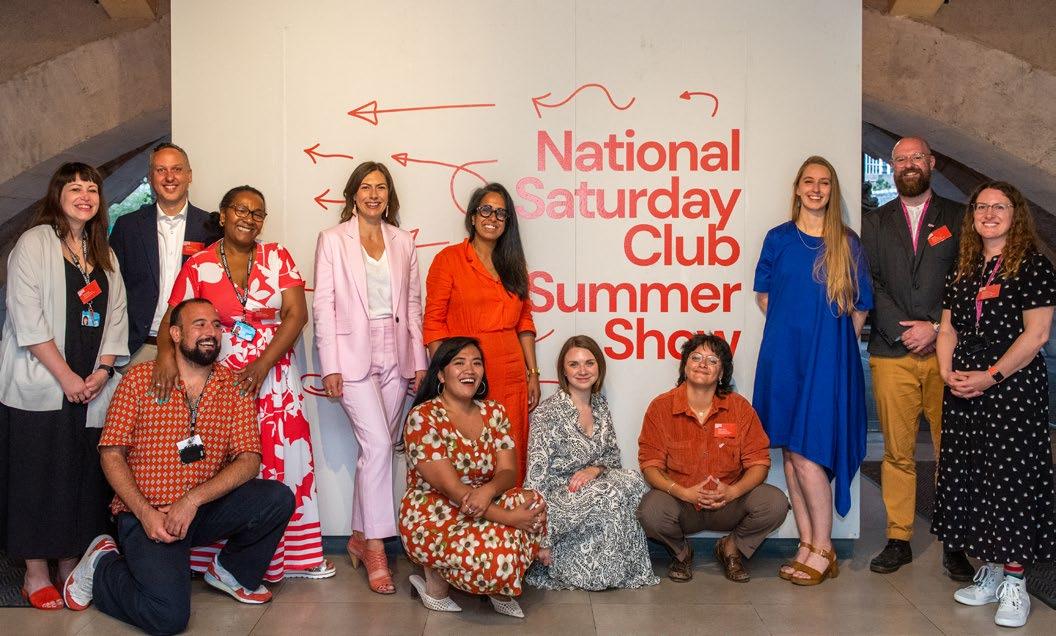
Executive summary 7
National Saturday Club team at the Summer Show Private View
Overview
Club subjects
“If we don’t have that generation of new creativity coming through, then we don’t make progress. When you see these young people and see their talent you feel reassured about the world’s direction of travel. What’s interesting is that Saturday Clubs enable young people who might not realise just how talented they are, to have that talent nurtured and to see possibilities that are beyond the experiences they would normally have. That’s a really, really powerful thing.”
Darren Henley, Chief Executive Officer, Arts Council England
Club subjects
Art&Design
Craft&Making
Fashion&Business
Film&Media
Science&Engineering
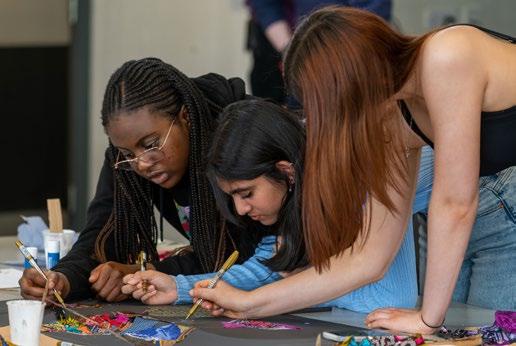
Society&Change
Writing&Talking
Art&Design
Art&Design is the longest running Saturday Club programme and has been generously supported by Arts Council England (ACE) since its inception in 2009. Art&Design Saturday Clubs provide members with an array of transferable skills that are greatly sought after by employers in the UK’s thriving creative sector and beyond. Through the exploration of practices such as printmaking, architecture, sculpture and painting, Club members problem-solve, collaborate and experiment, preparing them for exciting future pathways. The combination of imaginative thinking and technical skills that is at the heart of every programme is the foundation for a diverse range of careers, spanning animation, architecture, photography, illustration, graphics, fine art and more. In 2023, in alignment with ACE’s Let’s Create strategy, the National Saturday Club was awarded a Nationally Significant Project Grant supporting further expansion of the wider National Saturday Club network.
Club subjects 9
Across all Club subjects, the programme takes a creative pedagogical approach that introduces young people to the breadth of their chosen subject, builds vital skills, and makes visible the vast array of further study and future career pathways that are open to them.
"We are really excited about the potential for this new partnership to inspire young people across the UK to explore their creativity and hand-making skills. We hope that the Craft&Making Clubs will provide transformational opportunities to build their skills, develop confidence and discover pathways into craft careers, unlocking hidden talents in a new generation of professional makers.”

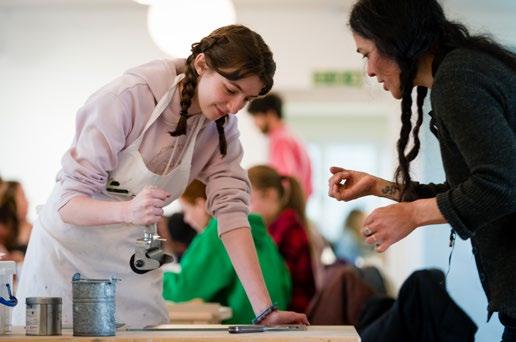 Deborah Pocock LVO, CEO, Queen Elizabeth Scholarship Trust
Deborah Pocock LVO, CEO, Queen Elizabeth Scholarship Trust
Craft&Making
In 2022–23 the National Saturday Club and Queen Elizabeth Scholarship Trust worked in partnership to launch the Craft&Making Saturday Club, generously supported by Howdens Joinery. Craft&Making Saturday Clubs give young people the opportunity to explore craftbased activities, developing their creativity and handmaking skills. Through the programme, Club members discover how the mastery of these skills sustains our culture and has wide applications across sectors such as heritage, the built environment and the creative industries. They also gain an understanding of the importance of retaining traditional craft skills, and learn how new technologies are evolving these traditions, ensuring they remain relevant in the modern world. Four host institutions piloted the programme in 2022–23 with seven Clubs planned for 2023–24, increasing to ten by 2025.
In partnership with Generously supported by
“Supporting and securing the future pipeline of creative talent to the industry is an integral part of the work we do at the British Fashion Council. Working with Saturday Clubs, who provide a tangible resource that offers a robust support and education programme, allows us to highlight the opportunities for further education and careers within the fashion industry, while giving students confidence in their chosen educational and career paths.”
Caroline Rush CBE, Chief Executive, British Fashion Council
Fashion&Business
The Fashion&Business programme has been generously supported by the British Fashion Council for the past eight years. Fashion&Business Saturday Clubs introduce young people to the latest industry thinking and the breadth of opportunities available in the dynamic fashion sector. In addition to considering themes such as self-expression and sustainability, Club members explore wide-ranging topics including trend-forecasting, embroidery, visual merchandising, pattern-cutting and styling. Throughout the programme, Club members develop practical skills and key transferable attributes, such as creative problem-solving and business acumen.
In partnership with
Overview 10
“We are excited to continue our partnership with the National Saturday Club through our National Lottery funded Young Creatives Programme, which will support the expanded delivery of Film&Screen Clubs throughout 2023-2026, giving children and young people across the UK the opportunity to try their hand at filmmaking and learn what it has to offer them – whether it’s storytelling, experimenting with ideas, developing new knowledge and skills, or learning about the plethora of screen careers.”
Sara Whybrew, Head of Lottery Skills Programmes, British Film Institute
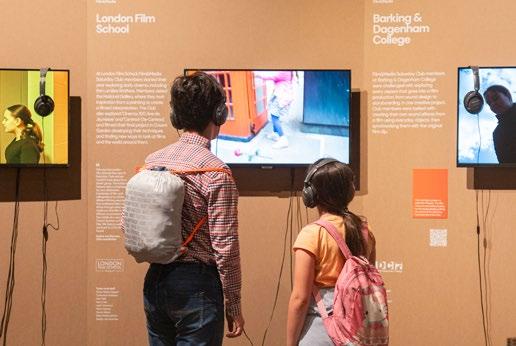
Film&Media
The Film&Media programme was launched in partnership with the British Film Institute (BFI) in 2021. Film&Media Saturday Clubs celebrate and introduce the breadth of film and screen skills from production, editing and sound design to VFX, scripting and animation. At the Club, members gain practical and technical insights, embracing the art of filmmaking and its ability to entertain and inform our society and culture. In 2023, as part of its National Lottery Young Creatives Programme, the BFI awarded “good cause” funding, to establish a further 40 Saturday Clubs across the UK, renamed as Film&Screen. These Clubs will provide the perfect space for young people to discover the burgeoning opportunities across this rapidly growing sector of the UK economy.
“The Saturday Club offers an incredible opportunity for young people to get an insight into some of the amazing work that scientists and engineers do. We find that very often, young people don’t know what engineering is, and the fact that they can have a go at interacting and problem-solving with engineers and scientists is hugely impactful. The feedback is always incredible which is a testament of the value that the Saturday Club offers.”
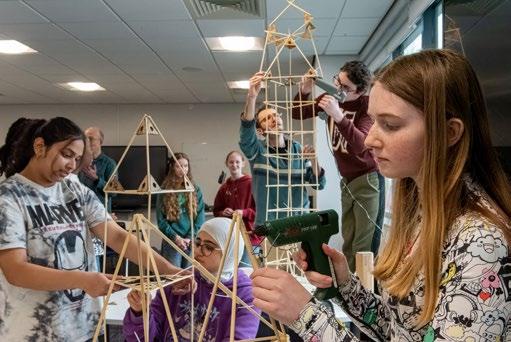 Caroline Hargrove CBE FREng, Chief Technology Officer, Ceres Power, and Non-Executive Director, Zedsen
Caroline Hargrove CBE FREng, Chief Technology Officer, Ceres Power, and Non-Executive Director, Zedsen
Science&Engineering
As we enter the fourth industrial revolution, it is vital for us to support a generation of creative and innovative scientists and engineers. Engaging with topics such as climate change, urban engineering and drone technology, the Science&Engineering Saturday Club introduces the latest industry thinking and technologies, encouraging members to develop practical and analytical skills. Through hands-on learning and real-life applications, Club members gain the confidence to explore the industries that quite literally shape the world around us.
Supported by
Club subjects 11
“Chatham House brings together its diverse areas of research to offer solutions to the world’s most pressing challenges. Young people will inherit an extremely volatile world, from living with the impacts of climate change to adapting to the AI revolution. It is crucial that we incorporate into our research the views and knowledge of those who will be most affected. We are proud to count on our partnership with the National Saturday Club as we seek to empower the next generation with the skills and experience to address the challenges of the 21st century.”
Chatham House
Society&Change
The Society&Change Saturday Club was launched as a pilot in 2022 in partnership with Chatham House. Since then, the programme has been generously supported by Jim and Caroline O’Neill. Society&Change Clubs provide a unique opportunity for young people to explore and discuss the issues that are shaping the world today and into the future. The Club introduces a range of jobs and careers that could shape our futures, across foreign policy and diplomacy, journalistic reporting, global supply chains, and the work of international humanitarian and development charities. From climate change and conflict to new technologies and taking action, Club members are able to listen, share their opinions and consider how they have a voice to influence some of the most important topics impacting our world today.
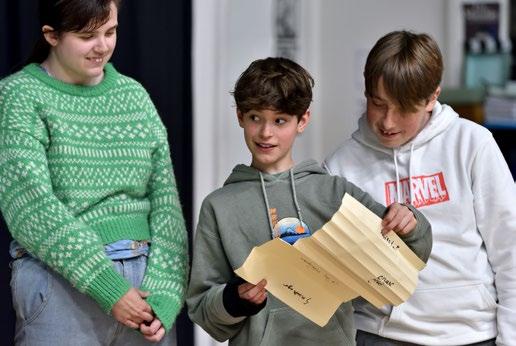
“The Saturday Club is an invaluable resource for young people across the UK. Through the Writing&Talking Club, they are encouraged to deepen their love of language, make valuable connections, and develop their own communication skills in an accepting and supportive environment. This positive programme introduces members to the possibilities of proper creative careers while simultaneously helping them build their own confident voices.”
Writing&Talking

The Writing&Talking Saturday Club imparts valuable and versatile skills that build confidence and provide pathways into a vast range of careers, including journalism, creative writing, advertising, publishing, communications and marketing. Club members explore how to articulate their ideas, communicate vision and present new concepts. Generating new and exciting work, the Club is a forum for young people to develop their critical thinking, curiosity and communication skills. Every year a diverse cohort of Club members are building their confidence and finding their voice. We can’t wait to hear what they have to say.
In partnership with
Overview 12
Deirdre McDermott, Picture Book Publisher, Walker Books
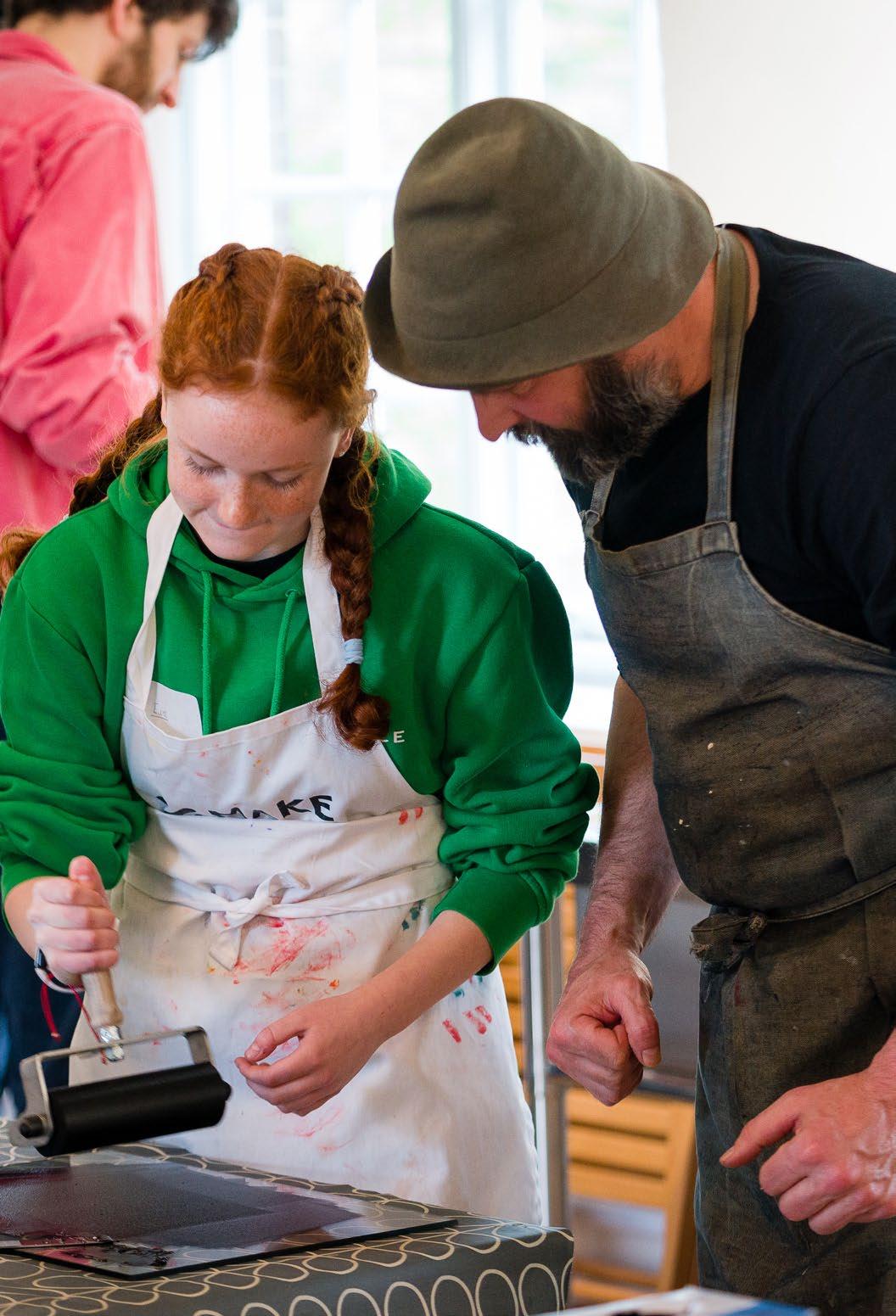
13 Club subjects MAKE Southwest Craft&Making Masterclass with Bonfield Block-Printers
Annual programme
Club members attend local classes every Saturday, at their local university, college or cultural institution. The National Saturday Club brings everyone in the network together for shared national events – the London Visit, Summer Show and Graduation Ceremonies – and organises a Masterclass for each Club, giving members a vital link to the professional world.
Weekly Classes
At the heart of the National Saturday Club are the weekly classes held at local universities, colleges and cultural institutions. Here, for up to 30 weeks a year, young people have the chance to work with experienced and inspiring tutors, exploring their curiosity for the subject, trying out new techniques and materials, and using specialist equipment that is not always available to them in schools. Club tutors put together inspirational programmes of activity that introduce members to a rich array of disciplines. Although the choice of activities and themes varies, all Clubs share the desire to create a relaxed atmosphere in which members are encouraged to explore their curiosity for a subject without the pressure of exams.
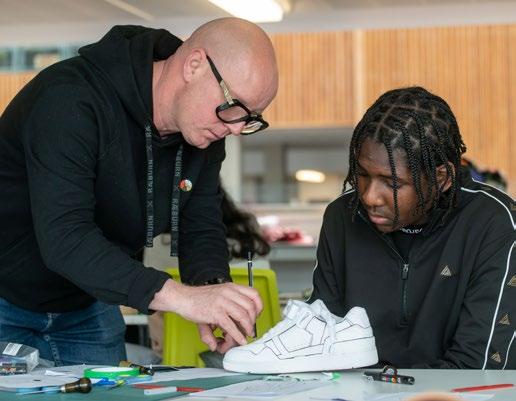
96% found the classes engaging
96% found the atmosphere at the Club welcoming and inclusive
91% felt that their skills have improved
Overview 14
Club is so much about exploring ideas without boundaries”
Club member, MAKE Southwest
National Events: London Visit
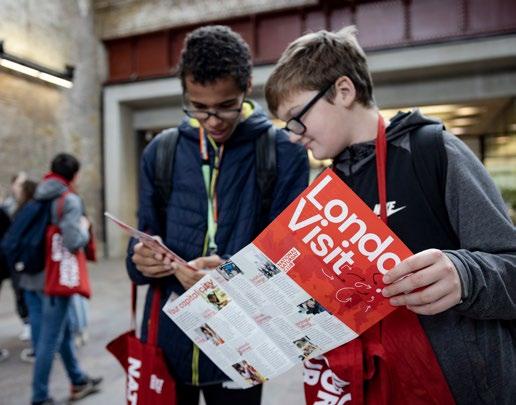
The London Visit brings the national network together at the beginning of the year and provides an opportunity for Club members to visit their capital city. Cultural experiences are arranged for each Club, with worldleading museums, galleries and theatres opening their doors to provide special access and bespoke workshops. At a welcome event generously hosted by Central Saint Martins, Club members also hear from inspirational speakers and see their self-portraits exhibited alongside those of their peers from across the network.
95% valued the cultural visit
95% agreed that the self-portrait exhibition celebrates young people’s individuality
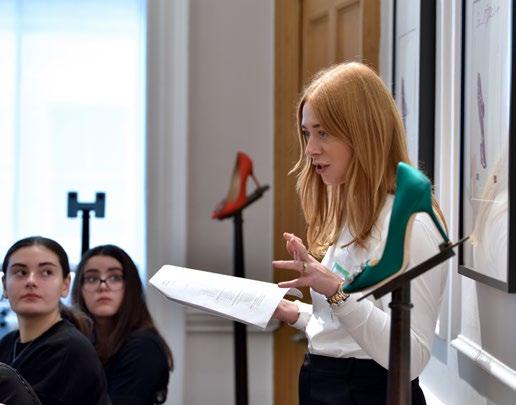
82% found the guest speakers inspiring and motivating
Masterclasses
Each Club takes part in a Masterclass delivered by leading industry professionals, giving Club members and tutors rare access to some of the UK’s most inspiring minds. Delivered by a network of over 200 generous individuals and organisations, each Masterclass draws on the Masterclass giver’s expertise and showcases how skills developed at a Saturday Club can be applied in the real world. For many young people, their Masterclass is the moment they realise that their interests have the potential to develop into rewarding careers.
96% enjoyed the Masterclass and found meeting industry professionals inspiring
93% learned something new during the Masterclass
80% gained a better understanding of job roles and career possibilities
Annual programme 15
“Saturday
Graduation Ceremony
Graduation Ceremonies provide an important moment for Club members to take pride in their achievements throughout the programme and to look ahead to future possibilities. At the event, tutors and inspiring guest speakers address the young people and each Club member receives a Certificate of Achievement, in front of their family, friends, peers and tutors. In 2023, the ceremonies were hosted by Bush House, King’s College London.
Summer Show
The culmination of the Saturday Club year is a public exhibition of Club members’ work at London’s prestigious Somerset House. It is a joyous celebration of the year’s achievements. Each Club presents a collaborative project to showcase their Club members’ work, and these displays are curated for the exhibition by Dallas-Pierce-Quintero with a focus on sustainable design. The Summer Show also includes events such as Private Views for Club members and a Private View for network guests, industry, the cultural sector, government and policy-makers.
89% of Club members valued the Summer Show
2,220 Graduation Ceremony attendees
10 inspiring guest speakers
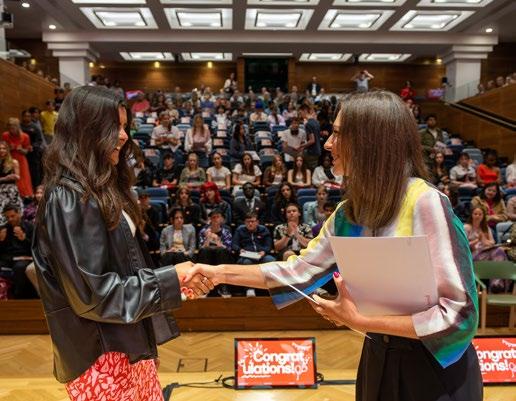
2,500 visited the Summer Show at Somerset House

Overview 16
“I learned so many new skills and met so many amazing people along the way. I was recognised for my work, and the support was amazing. We all have each other – and had so many laughs”
Club member, University of Wolverhampton
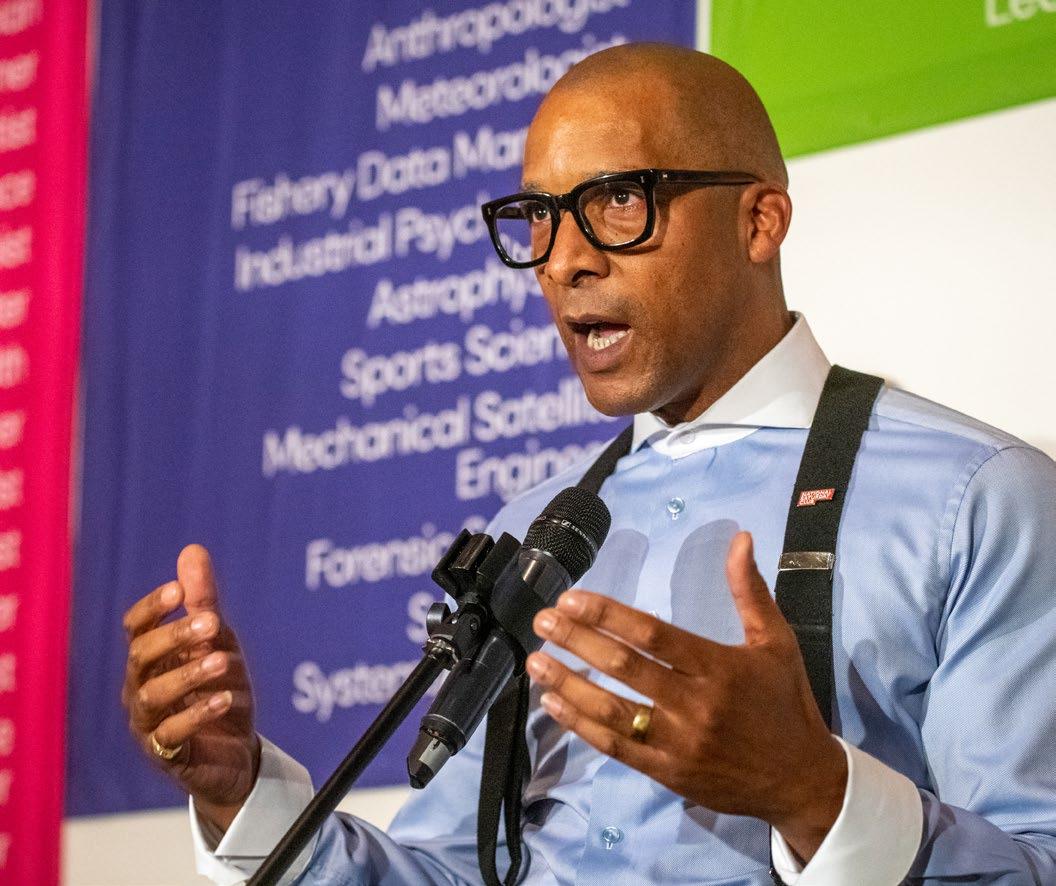
Annual programme 17
“What the young people are doing, it’s unbelievable. Supporters of the National Saturday Club are empowering hope that these young people can actually follow their dream…It’s an investment into the future, a beacon of hope and a testament to the incredible power of collective action”
Jay Blades MBE
Keynote speech by Jay Blades MBE at the Summer Show Private View
Tutors’ Programme
At the heart of the National Saturday Club are the tutors and coordinators who run the weekly Saturday classes and are inspiring a generation of young people. It is as a direct result of their commitment and expertise, their knowledge of widening participation, their dynamic pedagogical approaches, and their experience of youth engagement, that Club members grow in confidence, build their skills, and broaden their understanding of the breadth of future pathways open to them.
The annual Tutors’ Programme brings Club tutors and coordinators together quarterly, both in-person and online, to share best practice, hear from expert speakers, and feedback their experiences directly to the National Saturday Club team. The programme offers a professional development opportunity for the national network, celebrating its richness and creating an upward spiral of learning and development which informs the programme’s development.
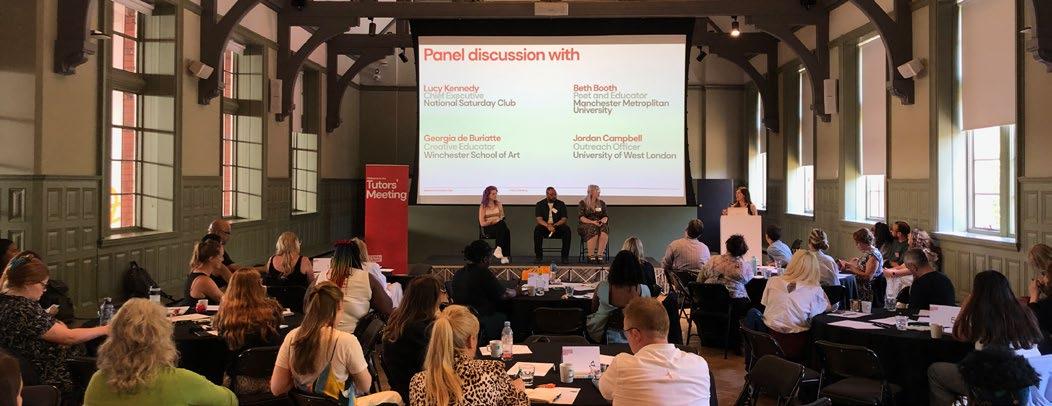
Overview 18
“I think it’s so positive that not only do the Club members learn from their Club but that we, as tutors and coordinators, have the opportunity to develop too”
Victoria Coutts, Club tutor, Birmingham City University
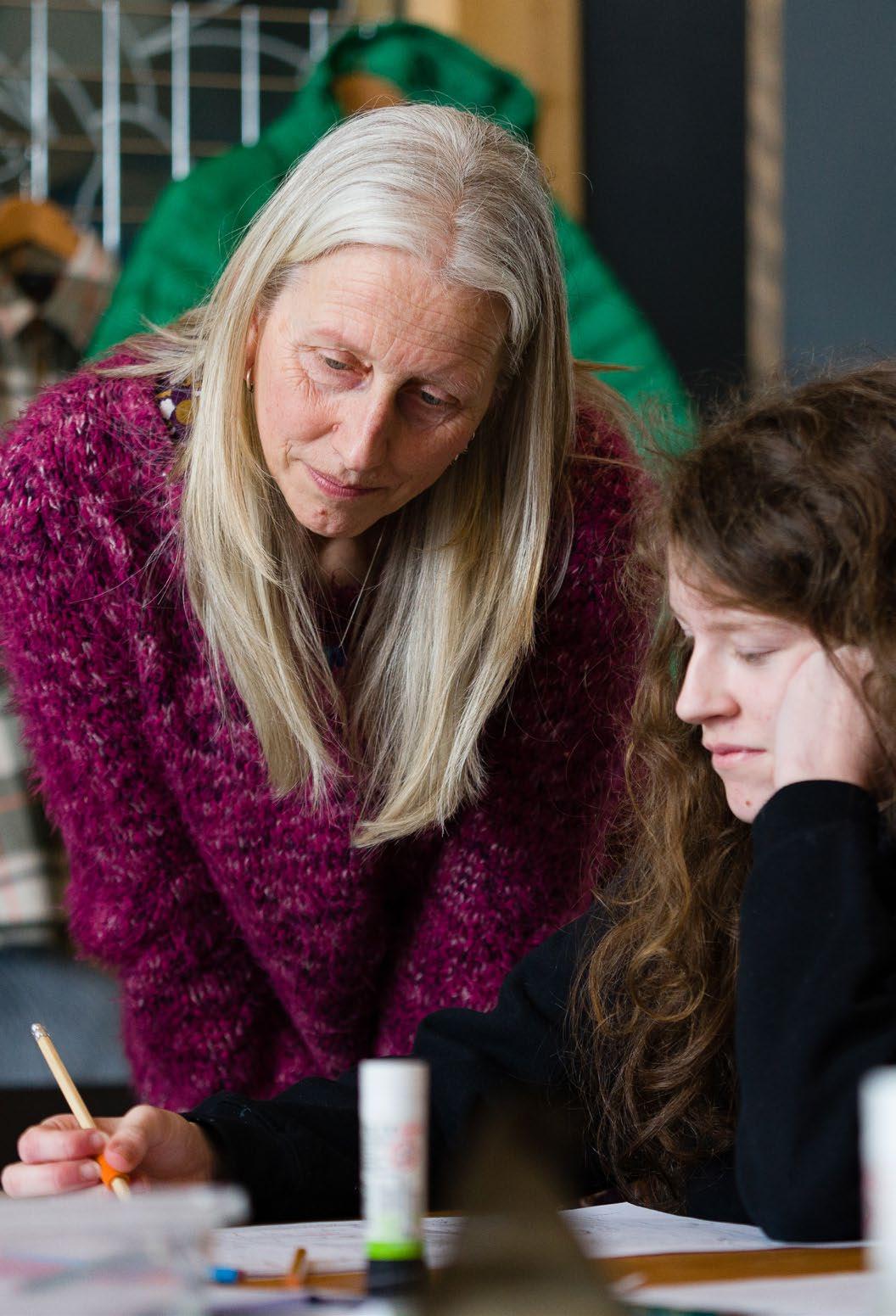
Annual programme 19
Hazel McGregor, Cornwall College Saturday Club tutor
Research and evaluation
Liz Cowley, Research and Evaluation Manager
Since its inception in 2009, the National Saturday Club programme has been evaluated to better understand the positive outcomes experienced by the young people taking part, as well as the beneficial impacts for Club tutors and host institutions.
The National Saturday Club places an open and reflective approach to learning, tracking progress and refining practice at the heart of its programme development. Findings have demonstrated consistent and long-term positive impacts on Club members, with these outcomes felt even more acutely by young people from widening participation1 backgrounds. In addition, across the national network of educators the sharing of best-practice continues to improve and develop practitioners’ skills.
Working alongside independent evaluation consultant Dr David Parker, we invite feedback from all key stakeholders including the young people, Club tutors and host institutions. It is through this approach to listening and iteratively responding to feedback that we continually refine and develop the programme to improve quality and output, honing a delivery framework that is informed by our beneficiaries and expert partners.
1. The National Saturday Club identifies young people to be from a widening participation (WP) background who: receive free school meals; have experience of the care system; speak English as an additional language; experience disability; parents/ guardians haven’t been to university; are refugees or asylum seekers; are young carers; are from a military family; are from an underrepresented ethnic background; have special educational needs; have a neurodiversity; are D/deaf or hard of hearing; are from a Gypsy, Roma, Traveller, Showman or Boating community; and/ or those who live in the 30% most deprived areas (Index of Multiple Deprivation).
Overview 20
“It’s been a pleasure to see Club members grow in confidence and explore their creativity, make new friends and hopefully leave with the belief that anything is possible”
Heidi Ramsay, Club tutor, Reading College
Club year in numbers 2022–23
Year in numbers
1,800 young people
94 Clubs
72 host institutions
400 tutors
200 student assistants
220 industry professionals
Club experience
92% said the Club fulfilled their expectations
93% would recommend the Saturday Club to a friend
96% found the classes engaging
96% found the atmosphere at the Club welcoming and inclusive
Outcomes
91% said their passion for the subject has increased because of the Club
84% have grown in confidence
80% found that attending has improved their outlook on the future
76% have got better at communicating their ideas
75% enjoy working with other people more
Club year in numbers 2022–23 21
“I feel important and special – like I can achieve anything!”
Club member, University of Derby
Creativity
The National Saturday Club evaluates how the programme cultivates young people’s creativity in relation to five capacities identified in a model of creative development conceived by Bill Lucas, Ellen Spencer and Guy Claxton. The five capacities are imagination, inquisitiveness, persistence, discipline and collaboration.2
98% noticed improvements in their creative capacities
Of the five capacities, collaboration and imagination were identified by Club members as those that they had most improved at the Saturday Club.
Progression, Careers, Study
63% say their future plans have been influenced by the Saturday Club (22% said don’t know)
84% have a better understanding of the study and learning options available to them
83% know more about jobs and careers that are available
54% have left the Club wanting a job within the Saturday Club subject (36% are unsure)
42% plan to apply to the college/ university where they attended the Club (41% are unsure)
Parent & Guardian feedback
99% said the Club was a positive experience
94% said their child was more confident
90% noticed that their child was more willing to try out new things and “have a go”
88% said their child’s creativity had improved
80% said their child’s wellbeing has improved
Overview 22
2. Teaching Creative Thinking: Developing Learners Who Generate Ideas and Can Think Critically (Pedagogy for a Changing World), Carmarthen, 2018.
“My son had thought university was not for him. The National Saturday Club made him feel completely differently and he is now planning to go to uni to follow the dreams he forged at Saturday Club. And he made friends, too! Life-changing in all the right ways”
25% 16% 64% 61% 33% Imagination Collaboration Inquisitiveness Discipline Persistence
Parent, Falmouth University
Widening Participation
83% of Club members are from a widening participation (WP) background.
Ethnicity
32% live in the 30% most deprived areas (Index of Multiple Deprivation)
32% do not have a parent or guardian who has been to university
20% receive free school meals
17% have a neurodivergence
13% speak English as an additional language
12% have a disability
12% have special educational needs
5% have caring responsibilities (are a young carer)
4% have experience of Care
3% are from a Gypsy, Roma, Traveller, Showman or Boating community
Since 2016 the percentage of Clubs with more than half of Club members from WP backgrounds has increased from 32% to 98%
65% White and/or White British
56% White British
1% White Irish
8% Any other White background
13% Asian and/or Asian British
3% Indian
3% Pakistani
2% Chinese
1% Bangladeshi
4% Any other Asian background
7% Black and/or Black British
4% African
2% Caribbean
1% Any other Black background
11% Mixed or multiple ethnic background
2% White and Black Caribbean
2% White and Black African
1% White and Asian
6% Any other Mixed or multiple ethnic background
Any other ethnic group
1% Arab and/or Arab British
3% Any other
Gender
69% Female
27% Male
2% Non-binary
2% Any other gender
Club year in numbers 2022–23 23 49% 46% 46% 59% 81% 49% 49% 63% 72% 83% 2013 –14 2015 –16 2019 –20 2017 –18 2021 –22 2014 –15 2016 –17 2020 –21 2018 –19 2022 –23
Edited by Rachael Moloney
Features Building skills for the industries of tomorrow 25 By design: a powerful network 31 Cultural access: a way in for young people 37
Building skills for the industries of tomorrow
The range of abilities required by employers today is evolving and broadening at an unprecedented speed. As we experience the fourth Industrial Revolution and work to meet green targets, core, cross-disciplinary skills are becoming critical for navigating the technological and practical changes transforming the workplace. In the face of worker shortages and rising global competition, both government and industry are keenly aware that adequate skills provision is essential for strong current and future labour markets. Indeed, more and more employers are taking a skills-first rather than a qualification-first approach to recruitment.
In their 2022 policy report Understanding Current and Future Skills Needs, the Skills and Productivity Board (since replaced by the Unit for Future Skills) stated:
Contributors
Leigh Adams
British Film Institute
Andy Haldane CBE
Royal Society of Arts
Caroline Norbury OBE
Creative UK
Deborah Pocock LVO
Queen Elizabeth Scholarship Trust
Patrick Reid
Imagination
Caroline Rush CBE
British Fashion Council
“The analysis identifies a set of ‘core transferable skills’ that are currently in high demand across many occupations…and are likely to continue being in high demand in the future. These include communication skills, digital and data skills, application of knowledge skills, people skills, and mental processes…Investing in the development of these core transferable skills is…likely to be worthwhile for government, as they equip people with skills that are important in many occupations [and] are transferable across occupations.” 3
The development of these capabilities is the central aim of the National Saturday Club’s extracurricular education programmes,4 whose evaluated impacts show that Club members build a variety of skills as a result of their Club experience, including problem-solving, creative and critical thinking, and an enhanced capacity to communicate and collaborate. These capabilities combine to form a powerful toolkit that can be tailored as young people progress through their formal education and towards employment.
3. Skills and Productivity Board, Policy Report, Understanding Current and Future Skills Needs, May 2022
4. Dr David Parker, National Saturday Club Annual Review 2021–2022, Cultivating Creativity and Critical Thinking
25 Building skills
Across diverse industries and sectors, transferable skills are in high demand, and playing an increasingly vital role in the economic success of the country. Our partners outline how the education programmes offered by the National Saturday Club are equipping young people with capabilities that will allow them to progress in a fast-changing work environment.
“Future generations of workers must be willing and able to embrace innovation and adapt to new challenges,”
says Caroline Norbury OBE, Chief Executive of Creative UK
“Skills such as critical and creative thinking, the ability to communicate effectively, to use initiative and intuition, and to work independently, will provide the foundations for future success. These attributes, increasingly valued by employers across all industries, are developed through creative learning. That is why we must ensure all young people have access to a meaningful creative education.
“The opportunities offered by the National Saturday Club are truly inspirational. If we are to give the next generation the best possible chance of success, it is imperative that we give them the skills they need to achieve it. With the lines between different industries and professions increasingly blurred, the National Saturday Club’s dynamic approach to sharing and advancing knowledge can help unleash a well of creativity across the UK.”
One of the UK’s great success stories5 in recent decades, the creative sector has long been reliant on the type of core, transferable skills that are now viewed as pivotal across industry. Yet if the sector is to remain valuable economically, it too must ensure employees seeking jobs in creative professions are sufficiently skilled. In its 2023 report At risk: our creative future, the House of Lords Communications and Digital Committee identified a number of “priority areas for attention”, including the significant demand for workers with “a blend of digital and creative skills”; “skills development, especially in technology, green and digital spheres”; “adaptable curricula”; and “collaboration between educational institutions and with industry”.6 Considering creativeindustry evidence contributed to its inquiry, the select committee also underlined the considerable potential value of following a STEAM (STEM plus Arts and Design) agenda in school curricula, commenting:
“We heard that developing creativity is not restricted to ‘creative subjects’: witnesses noted that all subjects, including maths and engineering, can be taught in a way that fosters creativity.”
Such an approach aligns closely with the National Saturday Club’s pedagogical practice and partnership structure, which allows young people to explore their individual creative potential, experience further and higher education environments, and engage with professional practitioners who can provide an insight into diverse careers.

Features 26
5. DCMS, DCMS and Digital Economic Estimates: Monthly GVA (to June 2023), August 2023
6. House of Lords Communications and Digital Committee, At risk: our creative future, January 2023
“With the lines between different industries and professions increasingly blurred, the National Saturday Club’s dynamic approach to sharing and advancing knowledge can help unleash a well of creativity across the UK”
Caroline
Norbury OBE, Chief Executive, Creative UK City of Oxford College Masterclass with E.L.V. DENIM
The BFI, awarding funds from the National Lottery, has supported the National Saturday Club’s Film&Media programme since 2021. Leigh Adams, former Director of Education and Learning at the British Film Institute (BFI), describes the current status of his industry from a skills perspective and points to the contribution the Saturday Club has made in developing fundamental abilities:
“The screen sector needs everyone from set designers and prop-makers to production accountants and hair and make-up artists, and currently there is a skills shortage in below-the-line (production) roles. Attitude is as important as technical knowledge, with employers looking for employees who can demonstrate teamwork and independence, agility, resilience and a willingness to learn. These are the attributes that can secure a college place, interview or job.
“Taking part in a Saturday Club programme is a unique opportunity to experience a professional environment, learning from people who are currently plying their trade in the screen industry, which spans TV, film, animation and gaming. Many of these sub-sectors share processes and skills which can be utilised across different areas. Taking up every opportunity and having a go are key to discovering what you enjoy and are good at, and a young person may find they like something which initially they thought they would not. The National Saturday Club is a perfect way to try things out, risk free, and to help build a future path.”

Caroline Rush CBE, Chief Executive of the British Fashion Council, which has sponsored the Fashion&Business Club since its launch in 2016, also highlights the role that the National Saturday Club’s programmes play in supplying young people with a set of skills and an industry awareness that will prepare them for entry into a rapidly evolving and diverse sector:
“The fashion industry is incredibly dynamic and plays a key role in our economy, employing nearly 900,000 workers across the UK. In such a fast-paced environment, it is vital for young people to develop creative problem-solving skills and business acumen, particularly to navigate key demands around a circular fashion economy, innovation, diversity, equity and inclusion. Educational programmes introduced at an early age, such as those offered by the National Saturday Club, are critical in developing the initial knowledge and skills required for prospective further education and career paths in the fashion business sector.
“Saturday Clubs allow us to highlight the wealth of opportunities within fashion, with each Club session providing hands-on experience and exposure to various fashion disciplines. Club programmes allow young people not only to nurture their creativity and develop technical expertise, but also encourage them to think innovatively and work collaboratively with their peers – all skills that will be highly useful when entering the workforce.”
27 Building skills
“The National Saturday Club is a perfect way to try things out, risk free, and to help build a future path”
Leigh Adams, former Director Education and Learning, BFI
Reading College Saturday Club Masterclass with Dazed Media
Since its founding, the National Saturday Club has expanded its programme offering from one subject area to eight, giving Club members the chance to explore a rich array of interests and educational settings they may not otherwise have been able to access. Spanning Art&Design, Craft&Making, Fashion&Business, Film&Media, Performance&Theatre (launching in 2023), Science&Engineering, Society&Change and Writing&Talking, the current range of Clubs affords learning and skill development opportunities that can raise young people’s aspirations and open doors to further study and ultimately jobs.
Deborah Pocock LVO, CEO of the Queen Elizabeth Scholarship Trust (QEST), which supports the Craft&Making programme launched in 2022, highlights the value of a diverse creative education and skill set in the craft industries, and of making young people aware of what career options exist:
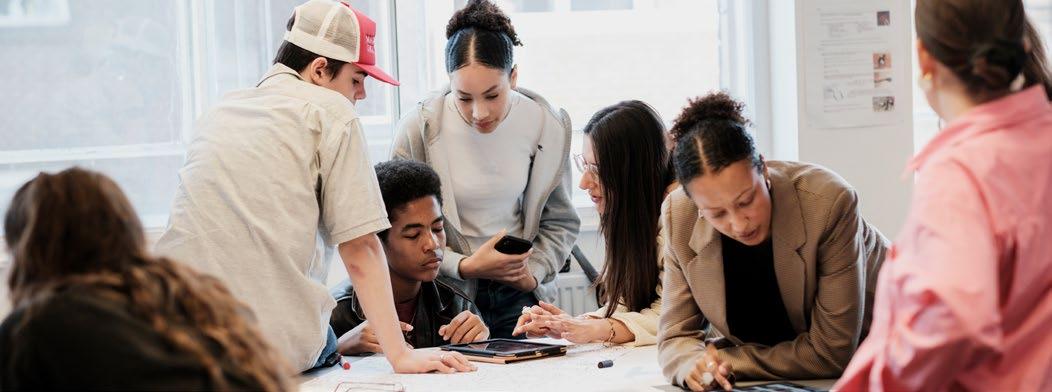
“The craft and making sectors have a huge array of opportunities for young people who are willing to develop their creativity through hand-making techniques. Practical skills, mastery of materials and craftsmanship are, and will remain, vitally important to the modern world. From creating everyday objects like clothes to conserving our historic buildings, making and creating are all around us. The makers and creators of the future will need to be imaginative and innovative, respecting past traditions but pushing the boundaries of techniques and materials. Above all, young people need to be aware that a career inspired by craft and hand skills is a viable and rewarding option.
“Craft and making is an inherently interdisciplinary subject – it uses creativity, design, technology, science, problem-solving and, of course, hand skills. The National Saturday Club provides a fantastic opportunity for young people to challenge themselves, try new things, build skills and develop their confidence. It is wonderful to see Club members flourish and unlock a hidden potential they may not have discovered without attending a Club.”
Across its subject spectrum, the National Saturday Club’s collaborative, project-based approach to learning provides Club members with a platform through which they can learn vital social and communication skills to complement abilities such as problem-solving and critical thinking – a combination of aptitudes that can serve them in further education and the world of work. Patrick Reid, CEO of global experience design company Imagination, a long-standing National Saturday Club partner, underlines the importance of these capabilities in his industry and beyond:
"We focus our teams on four behaviours: curiosity, bravery, rigour and respect. While these can be seen as traits, we see them as skills that can be learned and developed. They are particularly human skills, which are highly transferable. The future will definitely not look like the past and multiple career changes will become common. Rather than picking a specific sector or technology to focus on, a better approach is to develop enduring, holistic abilities that will help an employee navigate and adapt in a work environment of increasing change.
“The National Saturday Club offers a powerful blend of interdisciplinary learning, real-world experience and exposure to different disciplines and leaders in a particular field. With its focus on collaboration, creativity, adaptability and critical thinking, it builds the skills that enable young people to think big and make wonderful things happen as part of a team. It helps liberate and inspire young minds so they can glimpse a world of possibility, where they can develop their passions and feel confident to shape their future. It really does change lives.”
The need for employees, both new and existing, to be armed with flexible, cross-disciplinary skills is no longer a matter of debate – it is, by broad consensus, deemed a necessity. The evaluation shows that through their engagement with the National Saturday Club, 13–16-year-olds from a wide demographic nationwide are taking essential steps towards developing key abilities. As professional spheres become ever more complex, but also replete with opportunities for innovation, that preparation and inclusive approach to advancing diverse talents and capabilities will reap rich rewards for all.
Features 28
Fashion Retail Academy Saturday Club Masterclass with the British Fashion Council
Our data shows…
91% of Club members felt that their skills have improved
86% gained a better understanding how their new skills can be transferred into the future world of work
83% know more about jobs and careers that are available
76% have got better at communicating their ideas
69% have a greater understanding of the breadth of areas and disciplines in the subject
64% have noticed an improvement in their collaboration skills
63% of parents said their child had developed clearer ambitions
29 Building skills
“The skills of tomorrow will be those transferable capabilities –from creativity to communication, from resilience to citizenship – that can ride the rapids of technology. The National Saturday Club is just what is needed to nurture these next-generation abilities”
Andy Haldane CBE, Chief Executive, Royal Society of Arts
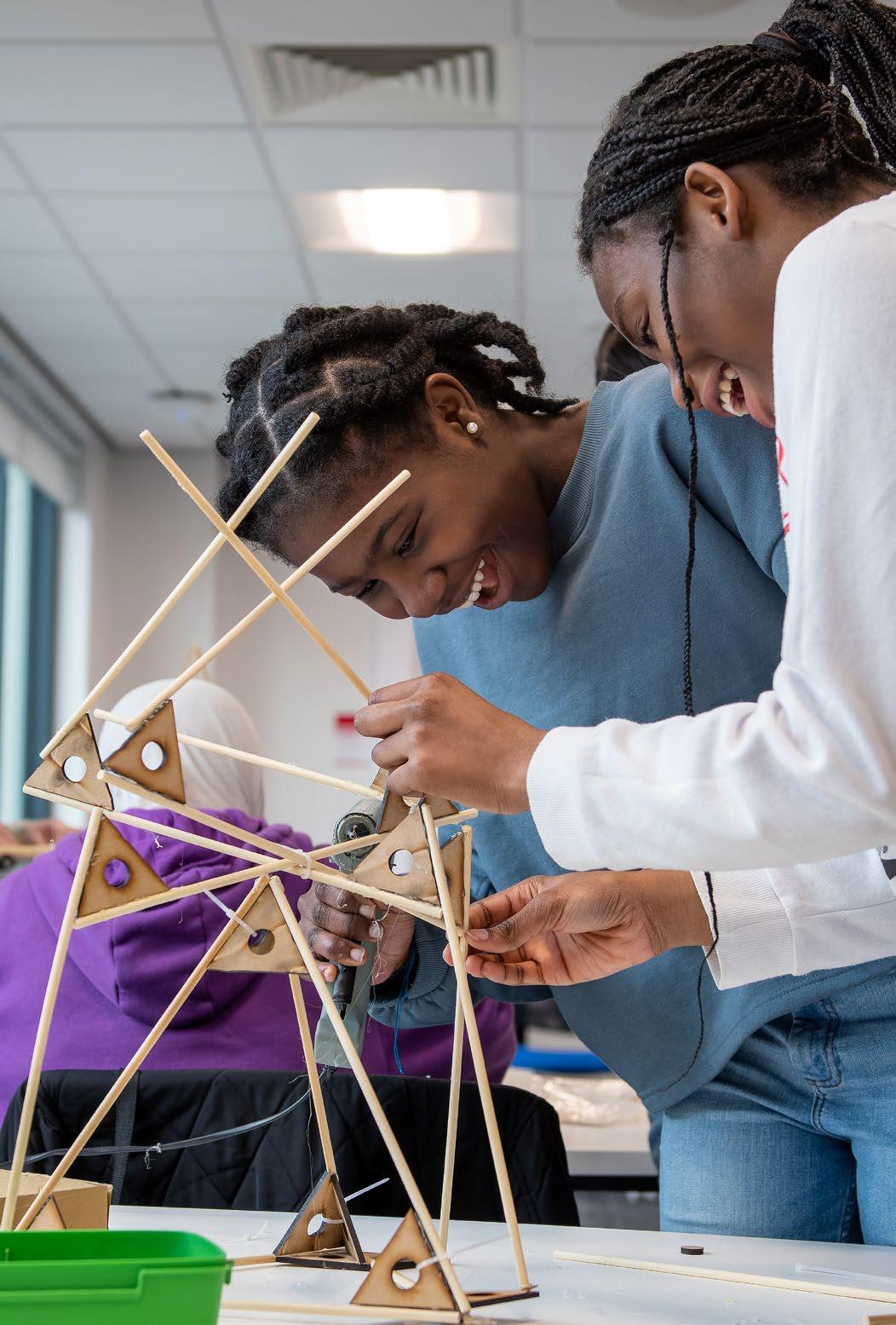
Features 30 Higher Horizons+ Saturday Club Masterclass with Price & Myers
By design: a powerful network
Since its launch in 2009, the National Saturday Club has evolved from a small pilot scheme to a nationwide organisation with a far-reaching impact. Its steady growth has been enabled by the Club’s essential design – a dynamic network of partners across education, industry and the cultural sector. Here we ask a selection of our educational partners to share their views on how the model enhances their capacity to empower young people.
The model for the fledging National Saturday Club had connectivity and scalability embedded in its blueprint. The early organisation’s hub-and-spoke framework – a compact central management team working in collaboration with a handful of educational institutions and industry professionals – has transformed into a widespread network of 72 partner universities, colleges and cultural institutions, working together to reach 1,800 young people throughout the UK in 2022–23. The defining feature of the model, these interconnected partnerships ensure the National Saturday Club remains a highly dynamic, cost-effective and flexible entity capable of functioning on multiple levels to deliver high-quality extracurricular education to a broad demographic of 13–16-year-olds.
“The National Saturday Club offers an excellent balance for learning providers and institutions seeking to develop their outreach offer. It provides a blueprint, and a clear structure and format, while leaving plenty of space for imagination and innovation in course design,”
Contributors
Sandra Booth
Council for Higher Education in Art & Design
Georgia de Buriatte
Winchester School of Art
Lisa Edwards
Bradford College
Dr Rhiannon Jones and Professor Keith McLay
University of Derby
Dr Neal Shasore
London School of Architecture
James Ward
Anglia Ruskin University
says Dr Neal Shasore, Head of School and Chief Executive of the London School of Architecture (LSA), a National Saturday Club partner since 2022.
“Our Saturday Club programme, ‘(Un)Building’, is the first dedicated to architecture, and it seeks to introduce students to bold ideas around the circular economy and sustainable design, and to a range of actors involved in the production of the built environment.”
31 A powerful network
Commenting on the way in which the LSA works with the National Saturday Club and the Club’s impact on both the School and its surrounding community, Neal continues:
“Having a central team on call to provide advice and encouragement is hugely reassuring, and drawing on the expertise of others within the network to test ideas is invaluable. Partnership with the Saturday Club over just one year has already added an immense amount to the LSA. There is pride in the programme across the organisation, from students and alumni to our administrative team, including faculty. We are immensely proud that 86% of participants in our Saturday Club pilot were of Global Majority heritage. The programme has thereby further catalysed our commitment to widening participation, and indeed has provided an ideal format for us to push forward on our Access and Participation Plan targets.”
As a longstanding educational partner, James Ward, Head of School, Cambridge School of Creative Industries at Anglia Ruskin University, points to core elements of the Saturday Club’s year-long programme that benefit both his institution and Club members in potent ways:
“Having worked in partnership with the National Saturday Club for over a decade, I have witnessed the advantages this unique model offers. The sharing of good practice for teaching sessions has been very beneficial to new academics in developing their careers. The industry Masterclass adds additional prestige to the opportunities young Club members have on a weekly basis, while the final exhibition at Somerset House can be a life-changing experience. The latter is witnessed when schoolteachers report back to the Club that after the young people have seen their work exhibited, they return to their studies with a confidence and enthusiasm that enables them to reach their full potential.”

Features 32
London Visit welcome event at Central Saint Martins
For Lisa Edwards, Learning and Quality Manager at Bradford College, which became a partner in 2013, frequent communication and sharing of information with the National Saturday Club’s management team are two important aspects of the model that have helped strengthen her institution’s engagement with the Club programme:
“This year has been a huge success for us. We have progressed from very little uptake for our Art&Design Club to a vibrant and busy Club and related creative community. This was the result of regular review meetings with a National Saturday Club director, which helped change the way in which we operate the Club and the vision of our department. We are extremely proud of the distance we have travelled and the growth of our Saturday Club, which wouldn’t have been possible without this support.”
Lisa also notes the impact that running a Saturday Club has had on her community at large:
“Bradford is the fifth largest local authority in England in terms of population size, and 26% of our population is under 18. It’s been particularly important to offer extracurricular activities to our young people, as 22% of children in Bradford live below the poverty line. Providing free Art&Design classes and access to tutors who are passionate about arts education, as well as industry professionals working in the creative industries, has had a transformative effect on many of the Club members who have joined the programme. We have seen vocational curriculum applications from our Club members and noted their achievements in our Level Two and Three curricula.”
As the partners above testify, the relationships between the National Saturday Club and the educational institutions that host its programme have the virtue of being mutually beneficial. The National Saturday Club can offer its collaborators a tried-and-tested programme framework, which can be nuanced to match the partner’s individual resources and outreach targets; and by return, the Club is able to give its young members access to top-level teaching environments that yield, as regular evaluation shows, numerous positive outcomes, including skill development, increased confidence and a greater awareness of further education and career options.

Professor Keith McLay, Provost, Learning and Teaching, Office of the Vice Chancellor, and Dr Rhiannon Jones, Associate Professor (Civic), at the University of Derby, a partner since 2022, highlight the ways in which the Saturday Club model aligns with their own institutional aims:
“As a Civic University, we have been able to co-design a unique delivery framework for our Society&Change Saturday Club, and the network we have created to enable this resonates absolutely with our ambitions as an institution. We are encouraging the next generation to think about citizenship, physically bringing them into the university space, and introducing them to other civic organisations in and around Derby.
“Running a Saturday Club at the University has enabled staff, students and external stakeholders from across our region to come together to create an outlet for young people to be creative, and to explore and develop their skills and interests. It has also provided them with a platform to share their thoughts and ideas locally, such as when we exhibited a range of their artwork this year at Derby County Football Club. Through working with volunteers, freelancers and early-career creatives, among others, to deliver a Saturday Club programme to inspire and inform everyone, an entire creative ecosystem has taken shape.”
33 A powerful network
“The National Saturday Club provides a blueprint, and a clear structure and format, while leaving plenty of space for imagination and innovation in course design”
Dr Neal Shasore, Head of School and Chief Executive, London School of Architecture
Northbrook College Saturday Club at a Masterclass with Cullinan Studios
As linchpins of the National Saturday Club ecosystem, Club tutors and student assistants frequently relay the significant benefits of a network structure that allows them to exchange information and pedagogical knowledge with their Club colleagues, and fellow further and higher education practitioners. Georgia de Buriatte, Access and Participation Tutor at Winchester School of Art, University of Southampton, and a member of the National Saturday Club Tutors’ Advisory Group, reflects on her personal experience:
“I was fairly new to teaching when I began tutoring a Saturday Club, so the Tutors’ Programme was an invaluable resource for me in terms of sharing best practice and pedagogy. The ability to meet and talk to other Club tutors creates a strong support network of like-minded professionals able to help you with any sticking points. Many elements of my current educational practice have been influenced by methods, tips and tricks that I have discussed with other Club tutors who have different backgrounds and life experience. The depth and variety of this knowledge has benefited my teaching in innumerable ways, making me a better and more empathetic practitioner for my students.”
The diversity of the National Saturday Club network lends the organisation powerful tools for growth, the plan for which is ambitious: to double the current number of Saturday Clubs by 2026. The model to facilitate this must be robust, and agile. The Club’s partnership structure has shown that it can be leveraged to allow for this development while maintaining a high standard of delivery and a collective alignment with the organisation’s foundational aim: to nurture young people’s skills and capabilities, and aid their advancement to further education and rewarding careers.
Sandra Booth, Director of Policy and External Relations at the Council for Higher Education in Art & Design (CHEAD), offers her opinion on the beneficial influence of the model on a young person’s educational experience and the network at large:
“By drawing on a wide range of pedagogies, perspectives and practices, effective partner networks such as the National Saturday Club enhance the capacities of all participants and providers. This enables the whole ecosystem to deliver a more sustainable and scaleable impact through collaborative rather than individual actions. Good communication, strong connectivity, shared values and a compelling common purpose bind the organisation together, allowing it to have an impact in numerous positive ways.
“Access and participation are crucial to foster inclusivity and transform the experiences and aspirations of a diverse and talented community of young people. Extracurricular creative education opens up young people’s hearts and minds to opportunities to selfactualise, experiment, express themselves and explore pathways to creative futures. Many are excluded from formal arts education and face other social, geographical and economic barriers, which the National Saturday Club consistently challenges.”
Our data shows…
98% of Club members agreed that the tutors were supportive and approachable
96% found the atmosphere at the Club welcoming and inclusive
96% found the classes engaging
84% said they had access to specialist equipment through their weekly classes
Features 34
“By drawing on a wide range of pedagogies, perspectives and practices, effective partner networks such as the National Saturday Club enhance the capacities of all participants and providers”
Sandra Booth, Director of Policy and External Relations, Council for Higher Education in Art & Design (CHEAD)
Over 14 years
13,500 young people have taken part

120 universities, colleges and cultural institutions have hosted Saturday Clubs
360 bespoke cultural visits have taken place
410 industry-led Masterclasses have taken place
660 Clubs have exhibited at the Summer Show at Somerset House
An idea with an eye on the future
As for many noted artists, designers and cultural leaders of their generation, John and Frances Sorrell’s early engagement with free post-war Saturday art classes paved the way for their careers and significant achievements in the creative industries.
After building a successful design business, they founded The Sorrell Foundation in 1999 to inspire creativity in young people. Using methods developed in their business, they devised programmes that would help schoolchildren explore their creativity and develop core skills, while working alongside professional designers and students on special projects. Over a span of 10 years, these projects involved thousands of children of all ages across the UK, and the learning from them formed the building blocks of the National Saturday Club.
The National Saturday Club was launched in 2009 for 13–16-yearolds. The ambition was to reimagine the Saturday classes that the Sorrells had benefited from as teenagers and offer young people free tuition in colleges, universities and other institutions, where they would have the time, space and facilities to develop their creativity and learn new skills.
In 2016, the Saturday Club Trust took over the development of the National Saturday Club network. The current reach of the Club, its span of eight subjects and evidenced impacts, reveal a network model that is transformative for Club members. For the nationwide partners and individuals who make delivering Saturday Clubs possible, it is a potent agent for allowing young people from all backgrounds to advance their talents and ambitions.
35 A powerful network

Features 36 UCL East Saturday Club visit to The Photographers’ Gallery
Cultural access: a way in for young people
Introducing young people to an inspiring variety of cultural experiences is a core element of the National Saturday Club programme. Around the UK, the Club’s extended network of cultural partners offers Club members the opportunity to explore diverse spaces and activities in their local community, while the annual London Visit affords tailored access to national institutions in the capital that many young people may never otherwise enter. In light of the vital role they play, we invited some of our cultural partners to offer their opinion on why welcoming all young people into cultural spaces matters, Dr Gus Casely-Hayford OBE, Director of V&A East, opens the floor, reflecting on his own cultural journey.
Contributors
Kate Bellamy
Clore Duffield Foundation
Dr Gus Casely-Hayford OBE
V&A East
Marcus Davey
Roundhouse
Emmie Kell
Arts Council England
Susan Raikes
Science Museum Group
Laura Sillars
MIMA, Teesside University
Esme Ward
Manchester Museum
Igrew up in a very untrendy London suburb, long before music conferred those neighbourhoods with any kind of coolness. It was a place that even in early childhood felt far away from everything. We lived on a street where the buses terminated. At first, I adored it, loved how everyone looked out for everyone else, but then slowly I began to begrudge the suffocating quiet and dislike that suburban tranquillity that sits in tension with the young.
I could not afford to travel. It was the arts that opened my mind – first books, then exposure to the success of my siblings, then good arts teachers and eventually art school. These things simply made me. Much of my experience was free at the point of access – schools, museums and arts education – and what came with it was a respect for publicly funded arts; a responsibility to give back; a sense of the important role of the arts in building successful societies.
One of the truly great pleasures of my role as Director of V&A East is spending time with young people. Shortly after I started in post, I rather rashly made a commitment to visit every secondary school in the four boroughs that surround our museum and collection centre – a mission designed to give me the chance to meet and to learn from young people in the 100-plus schools that encircle the Olympic Park in Stratford.
37 Cultural access
So far on this glorious odyssey, my biggest take-home lesson is that I am the main beneficiary of this schools’ tour. During every visit, I learn new things about this incredible generation of secondary-school students. They teach me about our history and our changing nation, and I am reminded of just how poorly we often serve them and yet how hopeful they remain despite the obstacles placed in their path. I am struck by how many beautifully equipped arts spaces in high-achieving schools are being shuttered because of a lack of resources; of how the visual arts are not regarded by many as core to a rounded education; of how communities are discouraging children from studying the arts for fear of how it will affect their future employability; of how the mental-health benefits of being exposed to the arts are not being shouted from the rooftops.
After each visit, I cycle away ever more determined that my institution will unstintingly put young people at the very centre of all that we do. We will address their needs; make them feel important and heard; reflect their interests and priorities in our exhibition and learning programmes; and aim to thrill, inspire and be useful to them. These are critical aspirations, yet they are also elusive, complex, subtle. The very notion of what culture is, is shifting, as the demands of the digital-first young change the way that culture is constituted and distributed, and how it connects us across geography and demography.
The creative industries are important to our economy and the arts are vital to our wellbeing. They are drivers of social cohesion: they build empathy and foster the kind of curiosity and understanding of others that is often sorely needed. My experience of meeting young people today is that they want the institutions they engage with to reflect current values, and to lead rather than follow in making critical changes in the areas of sustainability and diversity. They want to know that museums are interrogating collections and collecting ambitions to ensure that they reflect current concerns and principles – and ultimately that we are open propositions that embrace both iteration and change.
It is a huge gauntlet that Gen Z has thrown down to institutions like the V&A. We must see it as a great opportunity to shift our thinking and our ways of working, and to reflect the profoundly changing needs of society and young people. We must see it as a catalyst to re-engage with our sector’s founding aspirations of offering universal access to some of the world’s finest collections and deeply thoughtful curatorial narratives created for the broadest possible audiences.
 Dr Gus Casely-Hayford OBE Director, V&A East
Dr Gus Casely-Hayford OBE Director, V&A East
Features 38
University of Lincoln Art&Design Saturday Club visiting London Transport Museum
“Creativity and culture can have transformative effects on a young person’s life. From visiting museums and watching live theatre to taking part in an art class, these experiences can encourage curiosity, spark imagination, and develop their empathy and understanding of others and the world around them. Arts Council England believes every child and young person, no matter their background, should have a chance to be creative and have access to a remarkable range of high-quality cultural experiences.

“We know that people want to see more of the Arts Council’s funding directed at widening these opportunities. We want to support cultural organisations, community partners and the public to come together to make creative experiences available for all children and young people. Through our work, we see first hand that for most young people access to cultural opportunities outside of school and the home is too dependent on their social background. This must change. We see the success of the National Saturday Club as a critical part of the solution, to help ensure that all children and young people in this country can develop their creative potential.”
“Access to cultural experiences enables young people to find their own creative pathways and patterns. Physically, it allows their brains to make new neurological links and build new ways of thinking. Cultural experiences help young people move beyond the pushes and pulls of the digital age to generate an expanded sense of self. Personal resilience and mental health are live issues for young people today, and cultural experiences help build toolkits that can support them well into the future.
“There is evidence to suggest that we don’t have a full sense of reflective, consequential thinking until we are over 25. Cultural and creative opportunities enable young people to speak and be listened to; they step into the shoes of another human being and imagine the world through their eyes. As well as building confidence, this can help shape a world in which a capacity for empathy enables tolerance and equity.
“We believe that art and creativity keep us all young at heart, and at Teesside University we want to be here for people throughout their creative lives. Whether a young person is seeking a safe space outside of their formal education in which to grow, or they are destined to become an artist, a film-maker, a designer or a media producer, we can offer them a platform for experimentation.”
39 Cultural access
Emmie Kell, Director, Museums & Cultural Property, Arts Council England:
Laura Sillars, MIMA Director and Dean, School of Arts & Creative Industries, Teesside University:
Boston College Saturday Club visiting The Courtauld
“For most young people access to cultural opportunities outside of school…is too dependent on their social background. This must change. We see the success of the National Saturday Club as a critical part of the solution, to help ensure that all…young people in this country can develop their creative potential”
Emmie Kell, Director, Museums & Cultural Property, Arts Council England
We are hugely grateful to our collaborators across the UK who share the richness of their collections and deliver exciting workshops for Club members. We hear comments from a selection of partners about the importance of engaging with young people and what it means for their organisation.
“
“As budgets are squeezed, school trips and access to the arts get cut. Half of teachers surveyed by the Sutton Trust in Spring 2023 reported cancelling outings, with the most disadvantaged schools worst affected. If young people are not part of our great, and small, arts institutions, and do not have the tools, space and support to create and perform, everyone will miss out. Young people will lose the cultural capital that could transform their lives and the UK’s creative industries will lose their spark.
“The Clore Duffield Foundation is working with the National Saturday Club and exploring how we can partner with schools to help ensure artistic talent can be nurtured and supported wherever it exists, and that careers in the cultural sector are open to all. We also support Clore Learning Spaces in museums, galleries and theatres so that more children and young people can benefit from art, culture and heritage, and the inspiration, knowledge, joy and wellbeing they bring.”
At the Science Museum Group, our mission is to inspire futures. We do this by adopting a ‘science capital’ approach, so that everything is designed to encourage people to feel more comfortable and confident with science, technology, engineering and maths. We recognise the vital importance of opening up opportunities for all young people so they can explore different cultural and scientific activities and find those that excite and inspire them. By working together with the National Saturday Club – introducing Club members to great career opportunities in our Technicians Gallery at the Science Museum, for example – we can reach out to even more young people and provide them with positive experiences that can help shape their futures.”
“Every day we see the transformative effect of creativity on young people, which helps them to develop skills that will benefit many areas of their lives, such as their confidence, communication and self-esteem. With creativity crowded out of classrooms, it’s vital that we invest in cultural opportunities for young people. At the Roundhouse, this means providing a range of music, performing arts and broadcast projects alongside other creative initiatives, all underpinned by the brilliant youth work team in our iconic venue. We are delighted to be partnering with the National Saturday Club to run its new Performance&Theatre Club, which represents an important part of this mission.”
“Cultural experiences can have a profound impact on a young person’s perspective and view of the world. They can also encourage a greater self-confidence and willingness to express individual creativity. It is vital that cultural institutions of all shapes and forms are seen to be opening their doors to everyone, including those young people who feel they do not belong in certain spaces. If these perceived barriers are overcome, particularly at a young age, diverse cultural practices and a wealth of creative opportunities can be made available to as broad a community as possible.
“At Manchester Museum, we value and respect young people and are committed to making their voices heard by encouraging them to develop relevant content for museum programmes and supporting them within the museum and beyond. While enjoying a range of cultural experiences, young people tell us that they grow in confidence, widen their friendship group and feel a greater sense of belonging. Our partnership with the National Saturday Club will allow us to continue our work in showing how creative young people can be, how they can learn new skills and bring about real change.”
Features 40
Kate Bellamy, Director, Clore Duffield Foundation:
Marcus Davey, CEO and Artistic Director, Roundhouse:
Susan Raikes, Director of Learning, Science Museum Group:
Esme Ward, Director, Manchester Museum:
“If young people are not part of our great, and small, arts institutions, and do not have the tools, space and support to create and perform, everyone will miss out. Young people will lose the cultural capital that could transform their lives and the UK’s creative industries will lose their spark”
Kate Bellamy, Director, Clore Duffield Foundation
Our data shows…
60 museums and galleries across the country engaged with the programme in 2022–23
Club members said…
95% valued the cultural visit
85% found their cultural visits relevant and useful
79% have been introduced to culture, ideas and/or people that have inspired them
74% had not previously been to the museum or gallery they visited for the London Visit
71% are more interested in visiting museums and galleries after the London Visit
12% had never visited a museum or gallery before taking part in the programme
41 Cultural access
“By working together with the National Saturday Club …we can reach out to even more young people and provide them with positive experiences that can help shape their futures”
Susan Raikes, Director of Learning, Science Museum Group
Governance
Saturday Club Trust
and Frances Sorrell, Founders
Trustees
Sir Nigel Carrington, Chair
Katie Greenyer
Russell Lloyd
Krishna Maroo
Professor Nona McDuff OBE
Sim Scavazza
Frances Sorrell OBE, Founder
Sir John Sorrell CBE, Founder
Philip Watkins
Advisory Board
Caroline Hargrove CBE FREng
Dr David Parker
Patrick Reid
Cecilia Weckström
David Weil
Professor Julius Weinberg
The Saturday Club Trust is an independent charity set up in 2016 to take over the development of the National Saturday Club network from The Sorrell Foundation.
Established in 2009 by Sir John and Lady Sorrell, the National Saturday Club works with a shared purpose – bringing further education, higher education, industry and the cultural sector together – to deliver a transformational programme of extracurricular education for 13–16-year-olds nationwide.
By making all Saturday Clubs free with no exams, the year-long programme encourages young people from all backgrounds to get involved in a unique and exceptional process of discovery and learning that works alongside the school curriculum. Through weekly classes and national events, young people are connected with a national network of educators and industry professionals, giving them invaluable insight into the pathways to further study and rewarding careers.
The Board of Trustees and the Saturday Club Trust are ambitious and focused on ensuring that young people from all backgrounds and communities have access to the programme. Through the establishment of new Club locations, and by continually reviewing and removing barriers to participation, the Trust will continue to develop the National Saturday Club programme to offer this opportunity to more young people across the UK.
The Saturday Club Trust receives public funding from the Department for Education and the National Lottery through Arts Council England. It is also supported by the British Film Institute, the British Fashion Council, Chatham House, the Queen Elizabeth Scholarship Trust, the Clore Duffield Foundation and industry partners.
Saturday Club Trust 43
“Just imagine if every 13–16-year-old in the country had the opportunity to attend free Saturday classes”
John
Tutors’ Advisory Group
The Tutors’ Advisory Group (TAG) was initiated in autumn 2021 to bring the voice of the network to the forefront of programme development. Formed as a group of National Saturday Club tutors and coordinators drawn from across the country with a breadth of subject specialisms, educational expertise and backgrounds, the Tutors’ Advisory Group meets quarterly to explore key issues and topics central to the evolution of the programme.
2022–23 Tutors’ Advisory Group
Naomi Braithwaite Associate Professor, and Saturday Club Coordinator and Lead Tutor, Nottingham Trent University
Georgia de Buriatte Saturday Club Tutor and Coordinator, and Outreach & Engagement Tutor, Winchester School of Art
Asbjorg Dunker Senior Lecturer, Istituto Marangoni
Jayne Elwell
Lecturer in Art and Design, Northern School of Art
Jacoob Kimmie College Outreach Practitioner, University of the Arts London
Krishna Maroo Outreach Manager, University of West London
Camilla Jayne Robinson Widening Participation, City & Guilds of London Art School
Elle Simms
Experiential Learning Tutor, Rise Programme, Manchester Metropolitan University
Imogen Skipper Student Recruitment Officer, Buckinghamshire New University
Governance 44
Discussion topics
Topics for discussion are identified by both the National Saturday Club and members of the group covering commonly shared experiences, newly arising themes, and current challenges impacting the network. In 2022–23, three topics were explored:
Club member experience
Explored how the national network can make the programme even more accessible to a diverse breadth of young people, meeting specific young people’s needs, enhancing the participatory elements of national events and better supporting parents to engage with their young person’s experience of the programme.
Club tutor experience
Focused on how the National Saturday Club’s central team can further support tutors and coordinators including through the implementation of new technologies and systems, Tutors’ Programme events and activities, and continued recognition of tutors’ commitment and expertise.
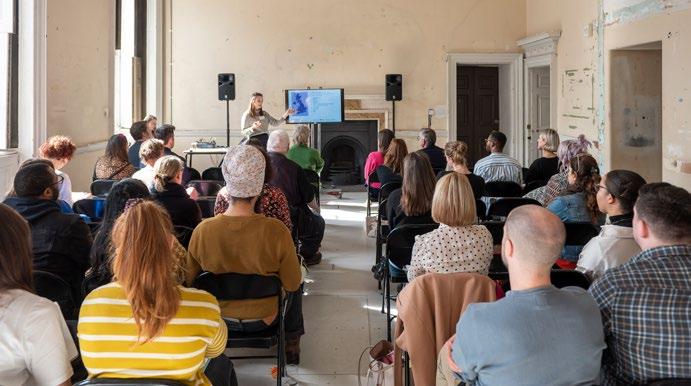
Programme development
Looked at how the National Saturday Club programme can be devised within the context of tutors’ own institutions to maximise impact. The group discussed topics including how best to communicate the value of the programme internally at their organisation, how to develop programmes which allow for flexible use of space, and how to encourage co-creation projects to support young person engagement.
Actioning feedback
The Tutors’ Advisory Group presents a quarterly report to the Board of Trustees, with a member of the group sitting as a trustee on the Saturday Club Trust Board, to ensure the tutors’ network informs organisational governance and decision making. The National Saturday Club team regularly reviews recommendations from the group, building new initiatives into the programme’s development.
This year, a CRM system has been newly implemented with a tutors’ ‘Exchange’ portal, allowing for streamlined communications and information sharing. The Tutors’ Advisory Group was involved with testing the system and advising on its usability.
In addition, updated best-practice case studies have been developed for the Tutors’ Handbook to better inform the network. Newly recruited Relationship Managers in the North and South West of the UK have also been working with tutors and institutions where additional support is required.
Tutors’ Advisory Group 45
National Saturday Club tutors’ meeting at Somerset House
Youth Board
The Youth Board is an important initiative, launched in 2022, that champions National Saturday Club young people’s voices and insights, bringing together alumni from diverse backgrounds and communities across the country to influence the future of the programme.
Why did you join the Youth Board?
“I want to be a voice for people like me who find going to groups like the Saturday Club a fresh start both socially and with the practical activities the Club provides”
Governance 46
Max
“It’s important that everyone’s voice is heard, especially those from minorities and those who can speak from experience”
Liam
“At the Club, I got to meet people of different backgrounds. We were able to share parts of our cultures, and come together”
Zhainab
2022–23 Youth Board
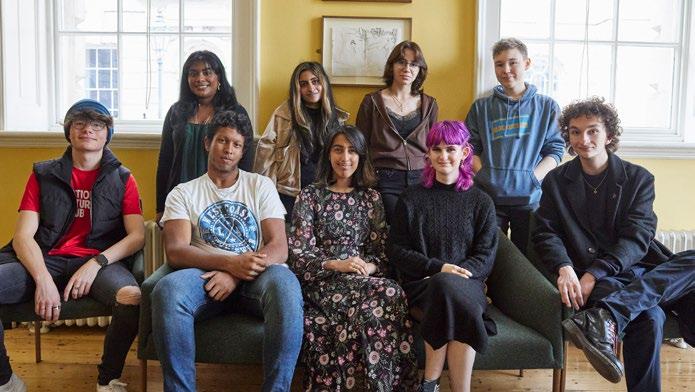
Betsy
Kathija
Liam Max
Nate Noreen
Rishaan
Yusra
Zhainab
Discussion topics
The first Youth Board discussion focused on establishing an open and collaborative approach to working together, exploring each member’s vision for the future of the National Saturday Club, and what they hoped to gain from their time on the Board. They identified three topics to focus their discussions:
Club member recruitment
Focused on how to improve the recruitment approaches of the National Saturday Club, including trialling new approaches to social media strategies for young people and parents; supporting Clubs to expand word-ofmouth awareness; developing new digital assets and disseminating promotional materials in different places and spaces frequented by young people.
Inclusive programming
Looked at expanding on the National Saturday Club’s inclusive programming approaches by considering the role of governance and ethics; exploring the definition of inclusivity and how to navigate this within programming; suggesting new approaches to ensuring Club members are identified by their chosen names and pronouns.
Club member alumni network
Discussed how the National Saturday Club might develop an Alumni Network that addresses the needs of Club members after they have completed their Saturday Club programmes. Also considered were the purpose of this platform; the research and development process; and the needs of the users.
Youth Board 47
National Saturday Club Youth Board, January 2023
What do you want to gain from the experience of being a member of the Youth Board?
“To provide insights that make future Club members’ journeys awesome”
Kathija
“To make new connections and meet new people”
Noreen
“To make the National Saturday Club experience even better for others”
Nate
Actioning feedback
With support from the Saturday Club Trust, the Youth Board produce an end-of-year summary of their discussions and recommendations, which is presented to the organisation’s senior leadership and Board of Trustees. This ensures that the voices and experiences of the National Saturday Club’s young people are incorporated into decision-making and the development of the programme at the highest level.
The National Saturday Club team regularly review recommendations from the Youth Board, building new initiatives into the programme’s development. In 2022–23, this has included informing early-stage thinking on the development of an accessible and engaging alumni programme; informing programming of the national events including guest speaker selection; and considering how the Club member recruitment strategy could best reach diverse young audiences.
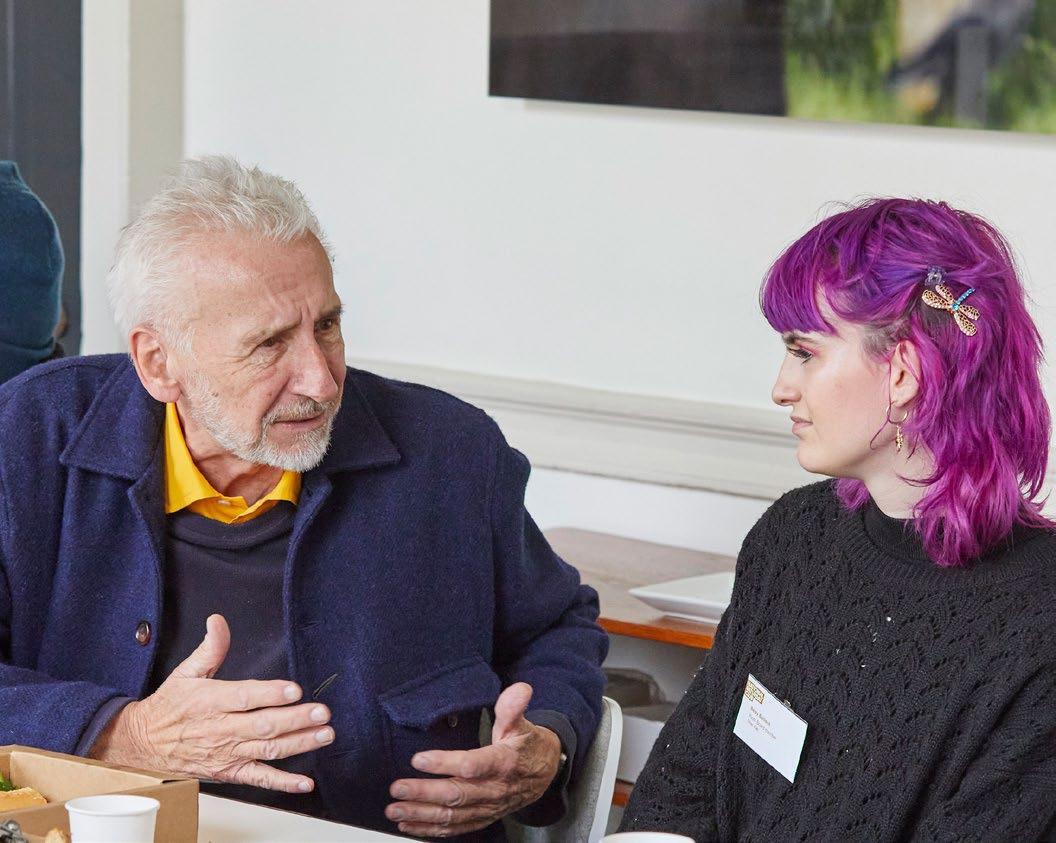
Governance 48
Youth Board meeting
“It’s been amazing, having been a member myself four years ago, it’s great to see what the Club is like now, and even more wonderful to help give the opportunities I got through NSC to future members”
Betsy
The Youth Board have reflected on their experience:
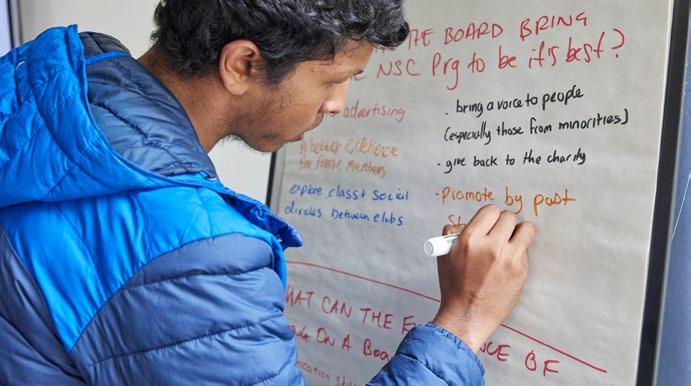
“This year, the Youth Board has discussed a variety of issues such as inclusivity, Club activities and recruitment. I am of the belief that these talks will help the National Saturday Club to become a safer, more inclusive place
“During the first year we have talked about lots of really relevant topics which are affecting young people right now. It has been both inspiring and enjoyable”
Youth Board 49
“Being on the Youth Board has been really inspiring and such a pleasure to be among a positive and diverse group”
Yusra
Liam
“When you meet genius brains and share ideas it creates a space where we value each other’s importance, which makes it an amazing experience”
Rishaan
that is enjoyable for all”
Nate
Youth Board meeting
Financial overview
Caroline Lloyd, Finance Director
The National Saturday Club has a robust and streamlined financial framework for programme delivery which encompasses year-round planning, monitoring and reporting.1 Budgets are set in advance of each academic year and are strongly adhered to, with the Chief Executive and Finance Director reporting quarterly to the Board of Trustees to ensure value for money and cost-effective decision-making.
Match-funded model
The programme is delivered through a unique matchfunded business model with 50% of programme costs covered by the individual host institutions (universities, colleges, and cultural institutions) and 50% covered by the Saturday Club Trust charity. This enables the National Saturday Club to be completely free for its beneficiaries at the point of delivery, removing barriers to access – which is a cornerstone of its mission and ethos. It is through this partnership model with HE, FE and Cultural sectors collaboratively supporting extracurricular education and cultural access, that the National Saturday Club and its partners can deliver the programme efficiently.
The National Saturday Club is responsible for expanding the reach of the programme, establishing new partnerships, and running the national network, alongside research and evaluation, marketing and communications and the delivery of national network events including the London Visit, Masterclasses, Summer Show, Tutors’ Programme and the Youth Board.
Host institution costs comprise tutors’ fees and materials for the weekly classes, and transport for Club members, where required. The cost per Club, per annum, to each host institution ranges from £9,692 to £13,6502 with an average of £11,000 per Club per annum, and varies dependent on the resource allocated to the delivery of weekly classes and the range of activities offered.
In 2022–23, the total cost of delivering the national programme for the Saturday Club Trust was £1,061,038 for 94 Clubs across 72 locations in the UK with 1,800 Club members. This was matched with a total investment by the university, college and cultural sectors of approximately £1,034,000.
1. Data taken from year end results, pending Independent Examiner’s review 2. This is an estimate based on a small sample of host institutions’ Club budgets
Governance 50
Saturday Club Trust income for 2022–23
The support we received:
£954,960
Arts Council England £605,000 (63.5%)
Development grant income and DCMS grant via Arts Council England
(£500,000 in 2022, 76.4%)
Industry partnerships £291,500 (30.5%)
Income from partnerships with the British Fashion Council, the British Film Institute, Chatham House, the Clore Duffield Foundation and Queen Elizabeth Scholarship Trust.
(£121,500 in 2022, 18.6%)
Other income £58,460 (6%)
Income from individual and industry benefactors and from philanthropic donations
(£33,343 in 2022, 5%)
The National Saturday Club has been core funded by the Department for Education and the National Lottery through Arts Council England since 2012. The current Arts Council England grant funds 45.2% of the annual programme. In 2022–23, project funding was also secured from Department for Digital, Culture, Media & Sport via Arts Council England for an 18-month period to further expand the programme’s reach by engaging more young people from underrepresented backgrounds. The British Fashion Council supports the Fashion&Business programme and in 2022–23 two new funding streams were secured to expand the number of subjects on offer to young people: the Clore Duffield Foundation for a Performance&Theatre programme, and the Queen Elizabeth Scholarship Trust for a Craft&Making programme with support from Howdens. The remainder of the Trust’s annual income is made up by additional smaller grants, partnerships, and philanthropy, together with in-kind support.
2022–23 has seen significant improvements in the diversification of income from three income streams in 2018 to seven income streams in 2022–23. The Trust is aware of the need to further increase income diversity to improve the financial stability of the organisation.
In 2022–23 there was an overall increase of 45% in income with a secured uplift for the following years up to August 2026.
These income figures exclude the significant in-kind support received from our generous supporters. Over the years, the Trust has established partnerships with many individuals and organisations who provide services free of charge or at cost. The value of these services has been estimated at well over £500,000 per annum and includes venue costs for the Summer Show from long term partner Somerset House, legal costs, digital, design and Masterclass givers’ fees.
Financial overview 51
63
Saturday Club Trust spending for 2022–23
The costs of running the programme:
33
We have maintained stability and predictability for our annual spending plans in line with the growth in Club numbers.
Cost to Saturday Club Trust
Approximate total match-funded cost
Cost per Club £11,288 £22,288
Cost per Club member £589 £1,164
Match-funded cost per class per member (based on a 30-week programme) £38.80 £1,061,038
Programme expenditure £347,424 (32.8%)
Delivery of annual programme of events
(£311,023 in 2022, 35.6%)
Staff cost £501,169 (47.2%)
Support team costs – salaries, national insurance & pension costs
(£324,504 in 2022, 37.1%)
Administration costs £212,445 (20.0%)
Property costs, IT, governance
(£238,509 in 2022, 27.3%)
Governance 52
Reserves
The Trust aims to build reserves of unrestricted funds to a level equivalent to a minimum of six month’s overhead expenditure which in the current economic climate has been budgeted at £350k. Reserves at this level will be sufficient to cover short term changes in financial circumstances without damaging the Trust’s charitable activities. The increase in reserves has been sufficiently strong to enable funding to support investment in the following areas:
- Expansion and development of the core staff team in line with agreed funding
- Further development and launch of a CRM system to support streamlined operational management of the network
Going Concern
In the current economic environment, there is an increased focus on going concern. The Trust has secured significant funding streams for the next three years and holds a cash balance at its year-end of £741,084. Using appropriate budgetary controls and even in the current tough economic climate, the Trust will continue to establish a sustainable structure for the future.
Funding network growth
The National Saturday Club has been in operation for fourteen years and as the network has steadily grown, the cost of delivering the programme and supporting the network’s development has increased. However, through economies of scale, as the number of Saturday Clubs increases over the next few years, the cost per Club is forecast to decrease with long-term value for money.
Funding commences in 2023-24 with a significant expansion of support from the British Film Institute through their Young Creatives programme for a threeyear period to August 2026. In addition, the Trust has recently secured an Arts Council England, Nationally Significant Project Grant to fund the planned growth strategy. The Trust has plans to establish a corporate philanthropy stream in the forthcoming year.
As we look to the future, we will seek new partnerships with grants, foundations, industry partners and philanthropic donors to support our ambitious growth strategy. It is as a direct result of this support that the National Saturday Club will be able to reach even more young people, develop research and best practice sharing for the wider sector, and expand the programme’s transformational impact.
Financial overview 53
Our Partners
Host institutions
This year, 94 Saturday Clubs were hosted by a committed national network of universities, colleges and cultural institutions. By running the programme, these institutions are providing invaluable extracurricular opportunities for young people in their local communities.
Anglia Ruskin University (CSES)
Art Classes Group
Arts University Plymouth
Banbury and Bicester College
Barking & Dagenham College
Birmingham City University
Boston College
Bradford College
Buckinghamshire New University
Cambridge School of Art, Anglia Ruskin University
Cambridge School of Creative Industries, Anglia Ruskin University
City & Guilds of London Art School
City of Oxford College
Coleg Sir Gâr
Cornwall College
Coventry University
Cranford Community College
Escape Studios
Falmouth University
Fashion Retail Academy
Ferens Art Gallery
Higher Horizons+
Hopwood Hall College, Rochdale
Istituto Marangoni
Keele University
Kingston University London
London Film School
London Metropolitan University
London School of Architecture
MAKE Southwest
Manchester Metropolitan University
Manchester Museum
Merrist Wood College
Middlesex University
MIMA, Teesside University
National Army Museum
National Maritime Museum
Northbrook College
Northumbria University
Nottingham Trent University
Reading College
Rotherham College
Shademakers UK
Screen and Film School Manchester
St Mary's University Twickenham
Staffordshire University
Suffolk New College
The City of Liverpool College
The Institute of Arts, Hull College
The Northern School of Art
The Oxford School of Drama at Wychwood School
The Studio Morland
Time and Tide Museum
UCL East
University of Bolton
University of Central Lancashire
University of Derby
University of Huddersfield
University of Leeds
University of Lincoln
University of Northampton
University of Salford
University of Sussex
University of the Arts London:
London College of Communication
London College of Fashion
Central Saint Martins
Camberwell College
University of West London
University of Wolverhampton
Winchester School of Art, University of Southampton
York College
York St John University
Host institutions 55
Masterclass givers
This year, 51 Masterclasses have been generously led by a wide range of inspirational individuals and dynamic teams across a breadth of industry sectors. Engaging with professional practitioners provides Club members with an exceptional opportunity to gain insight into career pathways and possibilities for their future.
Adobe
Alma Julius, Amelia Kekeh, Celeste Menich, Ioana Demian, Katy Phanides, Malin Persson, Monica Lopez, Sam Adeyemi, Will Brough
Creativity is in Adobe’s DNA. Their game-changing innovations are redefining the possibilities of digital experiences. They connect content and data and introduce new technologies that democratise creativity, shape the next generation of storytelling, and inspire entirely new categories of business. Adobe are passionate about creativity for all and inspiring the next generation to tell their stories through creativity.
AHMM
Claire Pollock, Dr Craig Robertson, Francesco Draisci, Martha Claudia Carini
Allford Hall Monaghan Morris is an architecture practice founded in 1989. It works around the world on projects across sectors and scales, from a transformative mixeduse masterplan to a small therapeutic space for a charity. The practice won the RIBA Stirling Prize for Burntwood School in 2015, and has won many other awards and critical acclaim for its work. Since 2017 AHMM has been an Employee Ownership Trust
Alexander McQueen
Arianne Scott, Cavan McPherson, Plum Ayloff
Alexander McQueen is a modern British fashion house driven by uncompromising craftsmanship and unparalleled creative vision. Founded by Lee Alexander McQueen in 1993, since his death in 2010, Sarah Burton, who arrived at the house in 1996 and worked alongside him, has been the creative director of women’s and men’s ready-to-wear and accessories.
Andrew Hammond
Andrew Hammond is the author and illustrator of Spacekid iLK, a graphic-novel series for ages 7 and up. He also works as a Creative Director at an advertising agency for video games, developing campaigns for clients such as Pokémon.
Andrew Winch
Andrew Winch, Drew Thomas, Jason Richardson
Andrew founded Winch Design in 1986 with his wife Jane. Since then, Winch Design has gone on to deliver some of the most iconic yachts at sea today. Now recognised as one of the world’s leading superyacht designers, Andrew’s unerring attention to detail and quest to push design and technical boundaries has successfully taken the business into the wider areas of aviation, architecture and interior design.
Arup
Alex Brook, Aravinth Pillay, Balduino Del Principe, Christopher Wong, Claire Munday, Daisy Hobson, Daniel Silva, Duncan Hough, Ed Clark, Emily Walport, Eva Coley, Guillaume Laurent, Harry Popplewell, Iana Iacovlev, Illia Afifuddin, Jaume Aranols, Garrote Jeffri, Jong Jonathan, Bayliss Lauren, Gough Lawrence, Adekoya Ludovica Pototschnig, Luke Harrison, Lydia Burkett, Mara Sio, Nicki Raymundo, Reza Khodadadi, Robbie Fogarty, Roxana Ivascu, Simon Jenkins, Sooruj Shah, Stuart Pearson, Tamy Bahrouji, Thomas Rose, Veedooshi Jugessur, Wayne Bartlett, Yimika Koya
Dedicated to sustainable development, Arup is a collective of designers, advisers and experts working across 140 countries. Founded to strive for humanity and excellence in everything that they do, Arup collaborate with their clients and partners, using imagination, technology and rigour to shape a better world.
Our Partners 56
Asma Istwani
Asma Istwani is a self taught, early career artist working in London and founder of art collective RIOT SOUP. Asma employs a variety of traditional and contemporary collage styles and techniques in her work, which has been described as energetic, emotive and surreal. She has been commissioned by several organisations on a variety of creative projects including Tate, Duke University Press and Jo Malone London.
Barnaby Barford
Looking at the world through the lens of the apple, London-based artist Barnaby Barford works across drawing, sculpture, film, installation and painting to explore the fundamental questions driving human nature and, especially, our incessant need for More. Barnaby is represented by David Gill Gallery, London. His work has been exhibited internationally and is part of many public and private collections.
Birungi Kawooya
Birungi Kawooya is an artist whose works celebrate Black womxnhood, elevating rest and joy. Through her Mindful African Art programmes, Birungi creates wellbeing spaces supporting participants to express themselves using vibrant African textiles. In 2022–2023 she was artist in residence with Njabala Foundation and 32 Degrees in Uganda and is excited to share her heritage through community art projects.
Bond & Coyne
Cynthia Porta, Erica Ciuffreda, Mike Bond, Oliver O’Malley
Bond and Coyne is a creative strategic brand studio in London. They work with ambitious organisations to turn knowledge into brand power. Their mission is to celebrate education in all its forms, opening up knowledge and opportunity to everyone, no matter who they are.
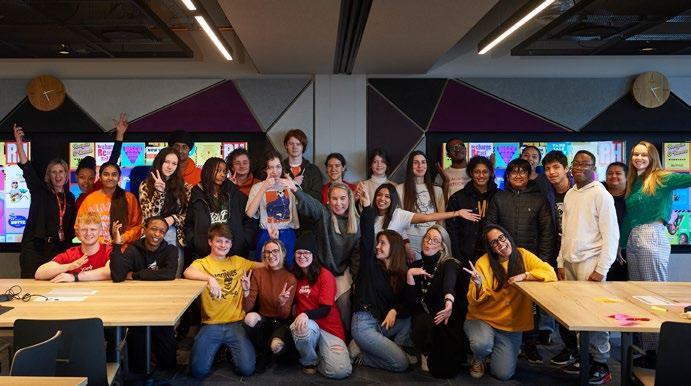
Bonfield Block-Printers
Cameron Short, Janet Tristram
Bonfield Block-Printers was founded by artists Cameron Short and Janet Tristram. Their offering includes blockprinted furniture, artisanal garments and bags, handprinted linens, cushions, lampshades and editions on paper. Their imagery is rooted in our deep affection for the countryside, its rituals and folklore and bygone rural life.
British Fashion Council
Anna Orsini, Emily Powick, Katie Rawle, Masie Clarke, Molly Scott-Wells, Nuria Garcia-Arbos, Pooja Willmann
The BFC is a not-for-profit organisation set up in 1983 with the role to strengthen British fashion in the global economy as a leader in responsible, creative businesses. The BFC Foundation brings each of the BFC’s charitable initiatives together under one umbrella to support the future growth and success of the British fashion industry. The Foundation achieves this goal by supporting designers beginning at college level and extending to talent identification, business support and showcasing schemes while addressing the need to increase the diversity of the talent pool and promote those who are leading the way in terms of environmental and community impact.
Cullinan Studio
Alice Kerry, Ana Franchini, Kristina Roszynski, Laura Turner, Mariah Jover
Cullinan Studio’s driving purpose is to reconnect people with nature. They believe the design of buildings is a social act which needs the involvement of all types of people to make good places for communities and nature to thrive. Through the National Saturday Club they hope to broaden the horizons of young people to consider a career in architecture.
Masterclass givers 57
Escape Studios Saturday Club Masterclass at Adobe
Danie Hadley
Danie works in digital marketing with an agency based in Norwich, Norfolk, supporting brands from a whole host of sectors in building their brand awareness and executing marketing strategies. Her background is in the museum and cultural sector – working across national museums and galleries in events, education and project management roles.
Daniel Durnin
Daniel Durnin is a multidisciplinary artist and maker. Having completed an MA at the Royal College of Art in Design Products, he also holds an MFA from Oxford University’s Ruskin School of Art, and a QEST scholarship.
Dazed Media
Eddie Langham, Emma Davidson, Erica Travis, Finn Langham, Jessica Langham, Rae Martins Ashton, Sofia Falsafi
Dazed Media is an independent media group renowned for producing award-winning stories across its industryleading print, digital and video brands. The company’s portfolio includes some of the world’s most influential arts, culture and fashion titles including AnOther, Dazed, Dazed China, Dazed Korea, Dazed Beauty and Nowness
Di’mond Qai Sharma-Joseph
Di’mond is an interdisciplinary artist, producer, writer and workshop facilitator based in London. Her work explores the human condition, through reflection, abstraction and interconnectedness within her solo practice, community work and work as part of Art Collective RIOT SOUP.
E.L.V. DENIM
Anna Foster, Martina Murasso
Anna Foster is founder and Creative Director of pioneering sustainable denim brand E.L.V. DENIM. Prior to founding the brand Anna had been a fashion editor for twenty years at publications such as Exit and i-D magazine. She then went on to be Fashion Director at Lula, and Fashion Director-at-Large at Australian fashion title RUSSH before deciding to focus solely on the brand in 2022.
Eden Stained Glass
Elizabeth Hippisley-Cox, Nerida Whale
Eden Stained Glass is a small stained-glass studio specialising in the conservation and repair of historic windows, and commissions of new works in stained glass.
English National Opera
Chris Bland, Danny Dalton, Poppy Harrison
ENO Engage exists to open up new possibilities for opera in people’s lives. They work with health trusts, schools, community organisations and partners across the country to deliver projects and activities that matter to people. And they do it through opera.

Our Partners 58
Winchester School of Art Saturday Club Masterclass with Andrew Winch
Eva Wong Nava
Eva Wong Nava is a child of the diaspora. She lives between two worlds and exists in many universes. She writes predominantly for children because this is her happy place. When not writing, she can be found in art galleries and museums, looking for the next story to tell from artefacts. Her flash fiction pieces have been anthologised and published in several places. Eva has several picture books published and more in the making.
Finisterre
Becky Cox, Joanna Bury, Millie Smith, Sophie Daniel
Born over a decade ago from the needs of hardy British surfers, Finisterre designs functional and sustainable product for those that share a love of the sea.
Flight Crowd
Ben Rochelle, Mariya Tarabanovska, Marsha Ilina, Nurina Sharmin
Flight Crowd is a global community set up to inform, engage and inspire the public on the future of flight. Through a variety of resources, events and initiatives, their not-for-profit enables people to learn about and interact with the Urban Air Mobility (UAM) and Future Flight ecosystems. By engaging with people from diverse backgrounds, abilities and education levels, Flight Crowd aims to empower communities and increase employability within the future flight sector.
ILM × Pinewood
ILM: Amy Backwell, Margit Norom, Pietro Ponti
Pinewood: Dan Burton
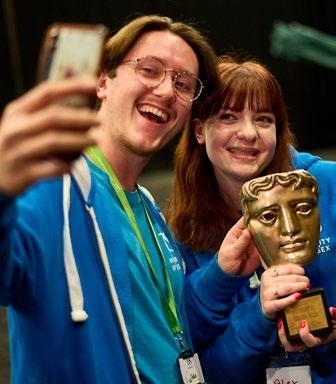
ILM is one of the leading effects facilities in the world. The company serves the motion picture, commercial production, television and attraction industries and has created visual effects for over 400 feature films. Founded in 1975 by George Lucas, ILM has created some of the most memorable visual effects in history.
Pinewood Group is the leading provider of studio and related services to the global film and television industry, and has been setting the stage for storytellers for over 85 years. Founded in 1936 and headquartered in the United Kingdom, Pinewood Group comprises UK-based Pinewood and Shepperton Studios as well as Toronto and Dominican Republic. Many treasured productions have been shot on our stages including 174 Oscar winners and 236 BAFTA winners.
Jade Francesca Signs
Jade Blackler
Jade Francesca Signs is a traditional signwriter based in the South West of England. They utilise the traditional craft and practices of signwriting to create bespoke pieces, for personal and commercial work, spanning many different industries.
Jason Bruges Studio
Coriolan Verchezer, Gavin Jones, Hazel Hedges, Jason Bruges
Jason Bruges is a London-based multidisciplinary artist and designer. Pioneering the space between art, architecture and technology, his artworks explore interventions and experiences that respond to their surroundings and connect people with their environments. In 2002, he founded Jason Bruges Studio, where he works with his team delivering projects worldwide.
Masterclass givers 59
“Talent can be found anywhere but that talent requires opportunity to tease it out. It requires inspiration and possibly even a bit of a road map too”
Cameron Short, Co-founder, Bonfield Block-Printers
University of Sussex Saturday Club Masterclass with ILM at Pinewood Studios
Jim Le Fevre is a BAFTA and BAA (British Animation Awards) award-winning animation director with over 20 years’ experience making commercials, title sequences and TV animation. As passionate about exploring traditional techniques as he is about experimenting with the animated form, he created the Phonotrope in 2006, a contemporary reworking of the Zoetrope, as well as the interactive process ‘Frames’.
Liam
Liam Shea is Artistic Director of Campfire theatre and has worked in Creative Engagement at the Orange Tree Theatre, Kiln Theatre and Shakespeare’s Globe. Campfire is a new theatre company who create queer theatre which tells stories that aren’t being told in the mainstream; people whose faces aren’t on our screens or our theatres; stories, characters and performers that represent our community as a whole.
Lilly Deeming
Lilly Deeming has been in the shoemaking industry for more than 10 years and has recently completed a two-year apprenticeship with Caroline Groves with the support of QEST. Lilly specialises in entirely handmade, hand-welted bespoke shoes. With her experience with Caroline, she has learned how to incorporate a whole multitude of other media into couture shoes.
Abigail Swain, Carla Filmer, Ellen Dick, Gabbie Sacco, Gabriella Minchella, Holly Roberts, Jodie Blake, Julie Henriksen, Rowena Butterwick
Manolo Blahnik is one of the world’s most influential footwear designers and the family-owned business has been running for over 50 years. Manolo Blahnik is a craftsman, and all the shoes developed are based on sketches which are translated into prototypes at specialist shoe workshops and are hand made in Italy. Manolo Blahnik is distributed in over 300 stores across the globe.
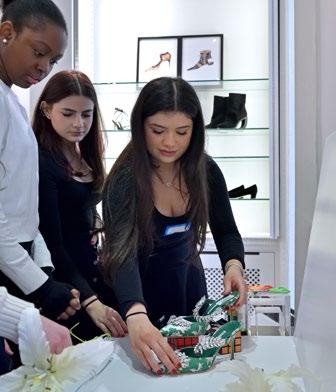
Marianne
Shillingford
Marianne Shillingford is the Creative Director of Dulux and founder of the Colour in Design Awards. With 30 years’ experience in the design industry, her career has been as circuitous as it has been rich and rewarding, from painting fairground rides to running her own interior decorating business and now working for the most successful paint brand in the UK.
Matt Jones is Head of Design at Lunar Energy, a company building the world’s best clean-energy products to deliver home electrification at scale. He’s been designing digital products and services since 1995. From 2013-2021 he worked at Google as a Principal Designer, primarily in Google Research working on AI concepts. From 20092013 he was a principal at BERG, a design and invention company in London that had projects exhibited at MoMA, and products featured in FT, FastCompany, Wired and Marvel comics.
Our Partners 60
Jim Le Fevre
Shea
Manolo Blahnik
Matt Jones
“Young creative people should know about the possibilities of employment in the most diverse areas of industry. To help nurture a desire to pursue a career that makes the most of their talents is such a privilege (and such fun)”
Marianne Shillingford, Creative Director, Dulux
Istituto Marangoni and UAL Central Saint Martins Saturday Club Masterclass with Manolo Blahnik
Mines Advisory Group
Jon Brown, Julie Noonan
The Mines Advisory Group (MAG) is a global humanitarian and advocacy organisation that finds, removes and destroys landmines, cluster munitions and unexploded bombs from places affected by conflict.
Monica Black
Monica has production-designed BAFTA and Emmynominated dramas – Free Rein for Netflix, The Victim, Trust me for BBC, Catastrophe for Channel 4 and various independent films. She studied a MA in production design at Kingston and a BA Hons in design from Edinburgh College of Art, before entering the industry.
Nyasha Daley
Nyasha Daley is an artist whose creative practices include poetry/spoken word and visual arts. She is highly passionate and deeply curious about people and prose, centred on the exploration of identity and democratisation of knowledge. She is a partner in marketing consultancy Varyah Ltd with husband Dwain Daley, a music producer and video editor.
Pentland Brands × Endura
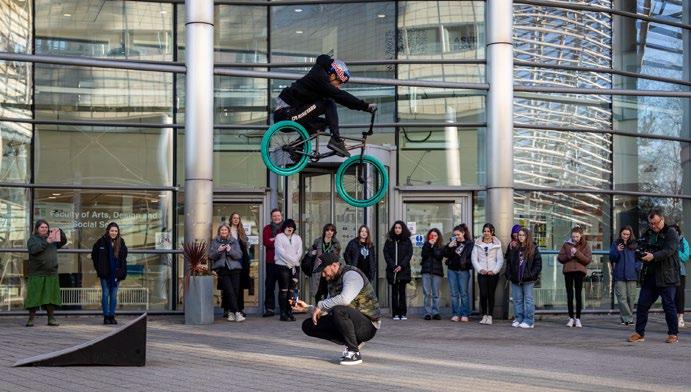
Beth Cadbury, David Johnston, Katie Greenyer, Katrin McDonald, Kriss Kyle, Natasha Henderson
Pentland Brands is the name behind some of the world’s best-loved sports, outdoor and lifestyle brands. They’re passionate about nurturing creative talent and have run their unique Design Pool programme for 20 years, providing up-and-coming designers with the opportunity to flourish in a competitive industry.
Endura has been engineering apparel and accessories for 30 years and has always been synonymous with innovative, bulletproof kit. From Mountain to Road, Gravel to Urban, Commute, Triathlon and BMX, Endura has evolved into an admired global brand with a rack of game-changing and award-winning products.
Polly Dunbar
Polly Dunbar is one of the best-known author/illustrators working in the UK today, she has created many much loved books for children. Polly’s bestselling book Penguin has won numerous awards including the Book Trust Early Year’s Award 2007, the Nestle Silver Children’s Book Prize 2007, the Practical Pre-School Award 2007, the Red House Children’s Book of the Year Award 2008 and was shortlisted for the Kate Greenaway Medal.
Price&Myers
Cathy Liu, Jake Phillips, Tim Lucas
Price & Myers is a firm of creative structural and civil engineers. They design all kinds of buildings and also work on projects like bridges and sculptures. Price & Myers often work with architects and sometimes artists and other designers. They have about 160 people and are mainly based in London with smaller offices in Oxford, Nottingham and Manchester.
Masterclass givers 61
University of Northumbria Saturday Club Masterclass with Pentland Brands × Endura
PriestmanGoode × Transport for Greater Manchester
PriestmanGoode: Chris Gregory, Guy Genney, Hanna Sparks, Kirsty Dias, Libby Howard, Luke Foster, Rashmi Bidasaria, Stina Hamsund Transport for Greater Manchester: Marie Godward, Sam Li, Samuel Knight
PriestmanGoode is a multidisciplinary design company specialising in transport design and passenger journeys: they are a collective of designers, creative thinkers and practical makers, strategists and trends forecasters with a common vision to imagine and shape the future. Human-centred at their core, they design products and services that are better for people, better for the planet and better for business.
Richard Malone
Richard Malone is an Irish designer working between Wexford, Ireland, and London. He graduated from Central Saint Martins in 2014 with his entire graduate collection being bought by Brown Thomas Dublin. Malone has an unwavering commitment to sustainability and is strongly against the concept of mass production, often releasing collections in strictly limited numbers.
Robert Walker
byUMBERTO is the studio of Robert ‘Umberto’ Walker –artist, artisan and educator. A lifelong learner & teacher, an advocate of sharing his expertise through ongoing workshops, lectures & community engagement, looking for new ways to inspire others. Trained in a multitude of craft techniques, Robert’s speciality is in the art of verre églomisé
Rosanna Bishop
Rosanna Bishop is a multidisciplinary artist, designer and maker, specialising in silk screen-printing, maximalist designs and hand-painted commissions. Working from her studio and print room, Rosanna uses her signature style to create bespoke designs to be sold as one-off art, fashion or interior pieces. Rosanna previously worked in luxury fashion houses and has spent many years collaborating on a freelance basis with a range of highprofile clients, such as Alexander McQueen, Fiorucci and JW Anderson.
RSHP
Dan Rogers, Ed Hiscock, Kelly Darlington
RSHP believe the world we build should be transformative, joyful to experience and continually adaptable. They are an architectural practice creating sustainable places for a better future.
Rubino Wilson
Daniela Rubino, Lauren Wilson
RubinoWilson is a teaching platform, fabrication service and shop. It was founded in 2019 by Daniela Rubino and Lauren Wilson, who studied sculpture at Central Saint Martins and the Slade School of Fine Art respectively.
Satellite
Edwin Mingard
Satellite is an award-winning film-production company specialising in artists’ moving image. Their work is socially engaged with a focus on social change. Their portfolio includes short and feature-length film and video work, as well as moving-image installation, documentary and music video.
Our Partners 62
“Being part of the National Saturday Club for over 10 years, I see up close the trajectory when young people appreciate that a job in design could align perfectly with their imagination and creativity. If you can’t see, you can’t do, and we need to ensure that everyone has the chance to access careers that can seem out of reach”
Katie Greenyer, Creative Talent & Networks Director, Pentland Brands
Scale Rule × London Zoo
Scale Rule: Alice Barnard, Andy McFadden, Aniong Kufre-Ekanem, Annie Johnson, Chinny Emodi, Elena Cros Carrilo de Albornoz, Gaia Laidler, Isuru Nanayakkara, James Parker, Melissa Ruckert, Oana Sala, Phil Isaac, Pranav Darda, Rachel de Matei, Rhiannon Brown, Tom Robertson
London Zoo: Heather Patrick, Holly Bestley, Kerry Bailey
Scale Rule are a collective that seek to promote diversity and public engagement in the built environment by encouraging better representation in the industry, and community participation on new projects. They engage people from all walks of life in the design process, and provide opportunities for professionals to be better informed about the people for whom they design.
London Zoo welcomes over a million visitors a year to discover amazing wildlife, to learn how the zoo is protecting their future, and to share incredible wildlife memories. London Zoo is part of ZSL (Zoological Society of London), a global wildlife conservation charity. They work in over 70 countries round the world, with every Zoo visit helping fund their vital work to restore habitats and protect wildlife.
Tejumola Butler Adenuga
Tejumola Butler Adenuga is a Nigerian-born, London based multidisciplinary artist and designer whose practice focuses on the intentional removal of informational excess from found photography through a subtle, minimalistic approach. His recent works fixates on creating fictional West African mythology, building a universe that tells a story of the development of West African tribes without influence and generational trauma. This is practised via the mediums of painting, furniture, design and art direction.
Tom Ryalls (BAP)
Tom is a writer and fundraiser, in both practices trying to change who gets to imagine what the future is like. Tom has made work or done residences at the Barbican Centre, Camden People’s Theatre, Theatre Royal Stratford East, ArtsDepot, the Royal Court, Oxford Playhouse and Theatre503.
Winnie Imara
Winnie Imara is the founder of Seven Black Women, a collective that aims to produce untold stories & create new opportunities infilm, TV and theatre through programmes, masterclasses and production. In previous masterclasses they’ve had guests working in Channel 4, BBC, Fable Pictures, Searchlight Pictures, the BFI, high-end TV dramas & more, they’ve recently produced a writers initiative called The Script Window, connecting emerging writers with industry professionals and look to build more initiatives and opportunities within the company.
Yorkshire Sculpture Park
Kathryn Brame Michelle Vesey Natalie Bellingham
Yorkshire Sculpture Park (YSP) is the leading international centre for modern and contemporary sculpture. Founded in 1977, YSP was the first sculpture park in the UK, and is the largest of its kind in Europe, providing the only place in Europe to see Barbara Hepworth’s The Family of Man in its entirety, alongside a significant collection of sculpture, including bronzes by Henry Moore and site-specific works by Andy Goldsworthy, David Nash and James Turrell.
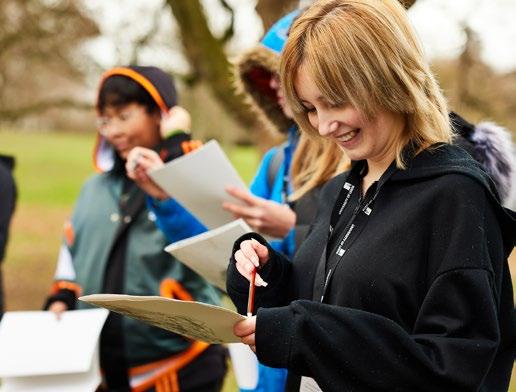
Masterclass givers 63
Multi-Club Masterclass at Yorkshire Sculpture Park
Cultural partners
An extensive network of prestigious cultural institutions works alongside the National Saturday Club, to open their doors and provide young people with access to invaluable experiences and unique opportunities such as exhibition visits, workshops and bespoke tours.
Cultural partners have included:
Barbican Centre
Design Museum
English National Opera
London Transport Museum
Natural History Museum
Science Museum
Somerset House
Tate Britain
The Courtauld Gallery
The Photographers' Gallery
The Whitworth Gallery
Tower of London
Victoria and Albert Museum
Yorkshire Sculpture Park
180 Strand
Our Partners 64
“The V&A loved hosting young people for the London Visit this year. We encourage them to continue to explore and take up space in the creative and cultural spaces in London and across the UK”
V&A Young People’s Team
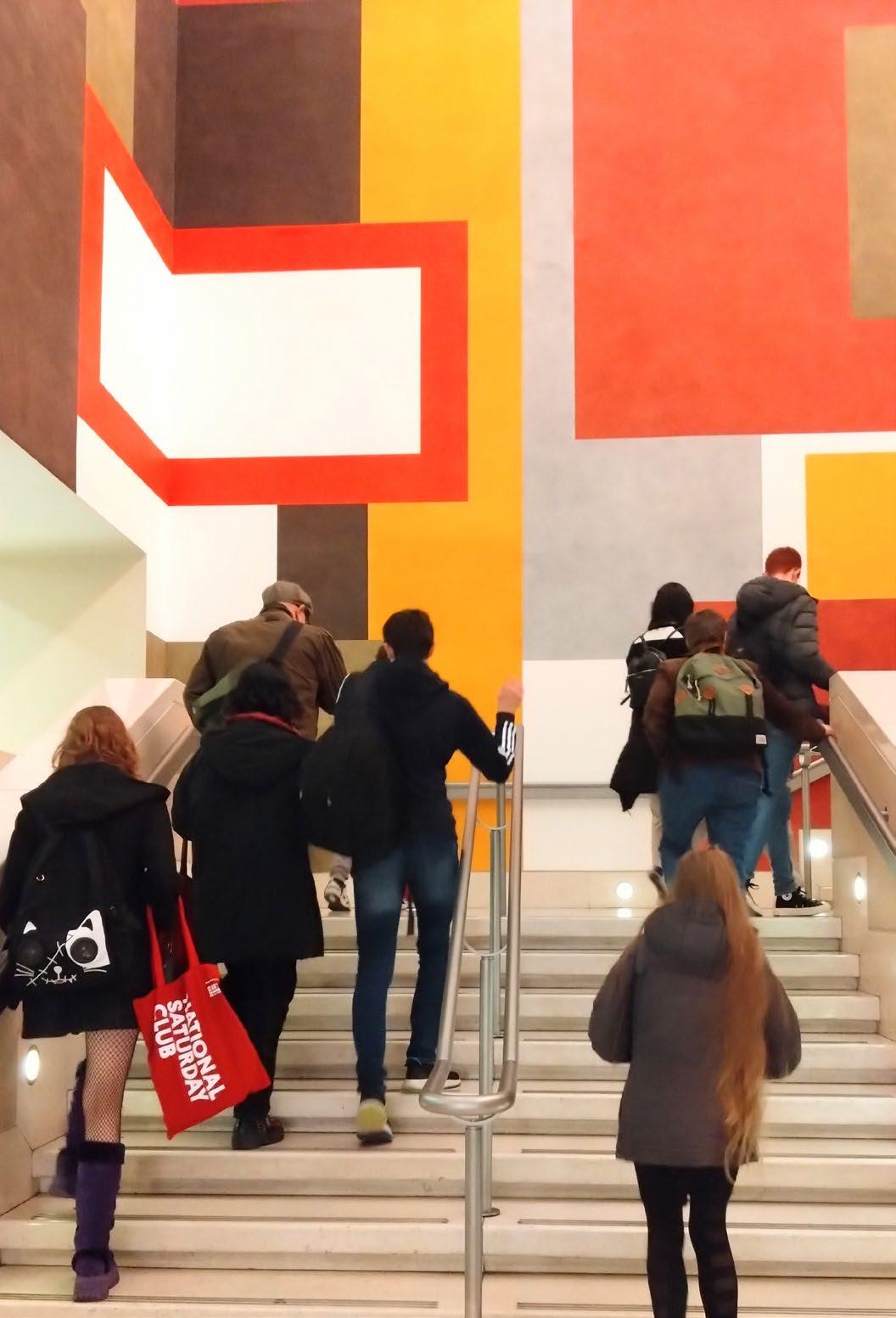
Cultural partners 65 Coventry University Saturday Club visit to Tate Britain
Thank you
The National Saturday Club programme is made possible by the commitment of the universities, colleges and cultural institutions that fund and deliver the weekly Saturday Clubs across the UK.
We extend our gratitude to the tutors and coordinators whose energy, commitment and expertise have inspired all Saturday Club members throughout 2022–23. We also thank the student assistants who support the teaching at the Clubs. A particular thank you to the following individuals who are leaving the programme this year and have been dedicated Club tutors and coordinators for many years: Charlotte Gaughan, Gwyl Lewis, Rosemary MacLennan-Crump and Hazel McGregor.
This year, 220 creative practitioners and industry professionals generously gave their time to lead inspirational Masterclasses. We are extremely grateful to them all.
A special thank you to our cultural partners for supporting the programme: the Barbican Centre, the Design Museum, English National Opera, London Transport Museum, the Natural History Museum, the Science Museum, Somerset House, Tate Britain, The Courtauld Gallery, The Photographers' Gallery, The Whitworth Gallery, the Tower of London, the Victoria and Albert Museum, Yorkshire Sculpture Park, 180 Strand.
Major support for the National Saturday Club programme is from public funding by the Department for Education and the National Lottery through Arts Council England, as well as by the UK Government through the Department for Culture, Media and Sport
Thank you to our Club subject partners the British Fashion Council, the British Film Institute (BFI), Chatham House, the Queen Elizabeth Scholarship Trust and the Clore Duffield Foundation. Thanks also to Jim and Caroline O'Neill for their generous support for the Society&Change programme.
Thanks also goes to our industry supporters Howdens Joinery and Pentland Brands, and to Bloomsbury Visual Arts for kindly donating books for the Fashion&Business Club members.
We are delighted to continue our long-term partnership with Cass Art who generously donate a percentage of profits from their Viridian Card to the National Saturday Club.
Thank you very much to Moët & Chandon for supporting the Summer Show Private View with their champagne.
We’re incredibly grateful for the long-term support and expertise of creative studios Dallas–Pierce–Quintero, Pentagram, Studio Quercus and You See Media.
Thanks also to our Summer Show venue partner Somerset House for their longstanding support. As well as to our Summer Show guest speakers: Jay Blades MBE, Sir Nigel Carrington, Nyasha Daley, Katie Greenyer, Patrick Harrison, Sir John and Lady Sorrell, Diana Spiegelberg and Professor Julius Weinberg.
A special mention to our founders, Sir John Sorrell CBE and Lady Sorrell OBE, for their continued guidance, vision and expertise.
Thanks go to Sir Nigel Carrington, Chair of the Board of Trustees, and Board members: Katie Greenyer, Russell Lloyd, Krishna Maroo, Professor Nona McDuff OBE, Sim Scavazza, Frances Sorrell OBE, Sir John Sorrell CBE, Philip Watkins. Thank you also to the Advisory Board: Caroline Hargrove CBE FREng, Dr David Parker, Patrick Reid, Cecilia Weckström, David Weil, Professor Julius Weinberg.
Thank you to the Tutors’ Advisory Group: Georgia de Buriatte, Asbjorg Dunker, Jayne Elwell, Jacoob Kimmie, Krishna Maroo, Elle Simms, Camilla Jayne Robinson, Imogen Skipper, Naomi Braithwaite. Thanks also to our Tutors’ Programme guest speakers: Hilary Carty OBE, Michele Gregson FRSA and Miranda Lowe CBE.
Our sincere thanks to the Youth Board: Betsy, Kathija, Liam, Max, Nate, Noreen, Rishaan, Yusra, Zhainab.
And finally, thank you to our extended network of freelancers and the National Saturday Club team: Lucy Kennedy (Chief Executive), Paul Allnutt, Nathalee Avery, Alex Bird, Toria Brook-Hill, Julia Brzozowska, Liz Cowley, Anisha Jackson, Caroline Lloyd, Dhiyandra Natalegawa, Carol Reid, Gemma Rust, Dhikshana Turakhia Pering, Liam Shea, Arilda Tymko.
Our Partners 66
Every year, the National Saturday Club brings together a diverse and talented national network of partners to educate and inspire young people nationwide. It simply would not be possible to deliver the programme without their support. Together, we look to the years ahead with ambition and energy.
In partnership with:
Supported by:
Programme partners:
Many Saturday Clubs across the country are generously supported by local businesses and organisations including:
Artcore
Aspire Higher
Charlton Athletic Community Trust
Chelmsford Science and Engineering Society (CSES)
City & Guilds Foundation
Creative Collisions
Derby County Community Trust
Derby Theatre
East London Arts and Music
Heritage Learning
RIBA
Rochdale Borough Council
The Fishmongers’ Company
The Worshipful Company of Coachmakers
Touchstones Rochdale
Winchester City Council
Young Greenwich
Thank you 67
saturday-club.org
hello@saturday-club.org
020 7845 5860
The Saturday Club Trust
Somerset House
London, WC2R 1LA
Reistered charity no. 1165362
Company no. 09559467
Design: Studio Quercus
With thanks to Pentagram
Data and Research: Liz Cowley
Features Editor: Rachael Moloney
Proofing: Mary Scott
Publication Editor: Toria Brook-Hill
Contributors: Leigh Adams, Kate Bellamy, Sandra Booth, Georgia de Buriatte, Dr Gus Casely-Hayford OBE, Marcus Davey, Lisa Edwards, Andy Haldane CBE, Dr Rhiannon Jones, Emmie Kell, Professor Keith McLay, Caroline Norbury OBE, Deborah Pocock LVO, Susan Raikes, Patrick Reid, Caroline Rush CBE, Dr Neal Shasore, Laura Sillars, Esme Ward, James Ward.
Thank you 69
Our Partners 70
 National Saturday Club Summer Show 2023 at Somerset House
National Saturday Club Summer Show 2023 at Somerset House




 Deborah Pocock LVO, CEO, Queen Elizabeth Scholarship Trust
Deborah Pocock LVO, CEO, Queen Elizabeth Scholarship Trust

 Caroline Hargrove CBE FREng, Chief Technology Officer, Ceres Power, and Non-Executive Director, Zedsen
Caroline Hargrove CBE FREng, Chief Technology Officer, Ceres Power, and Non-Executive Director, Zedsen



















 Dr Gus Casely-Hayford OBE Director, V&A East
Dr Gus Casely-Hayford OBE Director, V&A East











